Who Owns the Metaverse?
De Filippi, P. “Who Owns the Metaverse?” talk presentation for the 8th Hackers Congress Paralelní Polis (#HCPP21) organized by the Institute of Cryptoanarchy. Prague, Czech Republic. 1 October 2021
COMMUNICATIONS
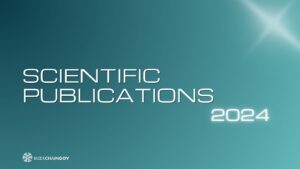 Articles, News, PublicationsBlockchainGov Scientific Publications 2024Scientific Publications 2024
Our team has worked on extensive academic research throughout the year, including ethnographic research on DAOs, governance disputes, AI system dissection, and more. Here is a complete list of all of BlockhainGov Scientific Publications in 2024: Mannan, M. & Pek, S. (2024) “Platform Cooperatives and the Dilemmas of Labor-Member Participation”, in New Technology, Work and Employment, Vol. 39, No. 2, pp. 219-237, https://doi.org/10.1111/ntwe.12273.Mannan, M. & Pek, S. (2024). “The Shadow of Digital Feudalism in the Distributed Metaverse”, submitted to Business & Society. Mannan, M. (2024) Blockchain Lawyering (first draft submitted to IGLP GSA 2024 in South Africa)Nabben, K. & De Filippi, P. (2024) Accountability Protocols? On-chain Dynamics in Blockchain Governance, Internet Policy Review. Volume 13, Issue 4Werbach, K, De Filippi, P., Tan, J., Pieters, G. (2024) “Blockchain Governance in the Wild”, Crypto-Economic Systems, Vol. 3, Issue 1. MIT Digital Currency Initiative. Mannan, M. & Pek, S. (2024) “The Regulation of Digital Labour Platforms: Broadening our Understanding by Embracing a Plurality of Organizational Archetypes” (to be submitted to Policy & Internet). Kamalova J. “Exploring Blockchain-Based Alternative Dispute Resolution: Limitations of Traditional Methods and Prospects for Further Research” (2024) Harvard Negotiation Law Review, ForthcomingBodo, B. & De Filippi, P. (2024) “Trust in Context : The impact of regulation on blockchain and DeFi”, Special Issue on The Impact of Emerging Technologies on Trust and Governance, in Regulation and Governance.Mannan, M. (2024) “From Digital Humanitarianism to Crypto-Humanitarianism”, International Trade and Business Law Review, Vol. 24, pp. 121-148. Merk, T. (2024) “The unusual DAO: an ethnography of building trust in ‘trustless’ spaces” (under revision at Internet Policy Review)Alston, E., & Cossar, S. (2024) “Encryption as Privacy” (submitted in SSRN, for submission at the Cambridge Law and Institutional Economics journal). Merk, T. (2024) “Why to DAO? A narrative analysis of the drivers of tokenized Exit to Community” in Proceedings of the European DAO Workshop, https://doi.org/10.48550/arXiv.2407.14327. [...]
Articles, News, PublicationsBlockchainGov Scientific Publications 2024Scientific Publications 2024
Our team has worked on extensive academic research throughout the year, including ethnographic research on DAOs, governance disputes, AI system dissection, and more. Here is a complete list of all of BlockhainGov Scientific Publications in 2024: Mannan, M. & Pek, S. (2024) “Platform Cooperatives and the Dilemmas of Labor-Member Participation”, in New Technology, Work and Employment, Vol. 39, No. 2, pp. 219-237, https://doi.org/10.1111/ntwe.12273.Mannan, M. & Pek, S. (2024). “The Shadow of Digital Feudalism in the Distributed Metaverse”, submitted to Business & Society. Mannan, M. (2024) Blockchain Lawyering (first draft submitted to IGLP GSA 2024 in South Africa)Nabben, K. & De Filippi, P. (2024) Accountability Protocols? On-chain Dynamics in Blockchain Governance, Internet Policy Review. Volume 13, Issue 4Werbach, K, De Filippi, P., Tan, J., Pieters, G. (2024) “Blockchain Governance in the Wild”, Crypto-Economic Systems, Vol. 3, Issue 1. MIT Digital Currency Initiative. Mannan, M. & Pek, S. (2024) “The Regulation of Digital Labour Platforms: Broadening our Understanding by Embracing a Plurality of Organizational Archetypes” (to be submitted to Policy & Internet). Kamalova J. “Exploring Blockchain-Based Alternative Dispute Resolution: Limitations of Traditional Methods and Prospects for Further Research” (2024) Harvard Negotiation Law Review, ForthcomingBodo, B. & De Filippi, P. (2024) “Trust in Context : The impact of regulation on blockchain and DeFi”, Special Issue on The Impact of Emerging Technologies on Trust and Governance, in Regulation and Governance.Mannan, M. (2024) “From Digital Humanitarianism to Crypto-Humanitarianism”, International Trade and Business Law Review, Vol. 24, pp. 121-148. Merk, T. (2024) “The unusual DAO: an ethnography of building trust in ‘trustless’ spaces” (under revision at Internet Policy Review)Alston, E., & Cossar, S. (2024) “Encryption as Privacy” (submitted in SSRN, for submission at the Cambridge Law and Institutional Economics journal). Merk, T. (2024) “Why to DAO? A narrative analysis of the drivers of tokenized Exit to Community” in Proceedings of the European DAO Workshop, https://doi.org/10.48550/arXiv.2407.14327. [...]
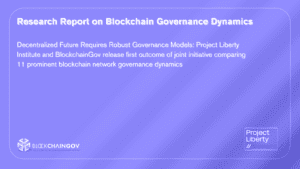 Polycentrism, Publications, ReportsResearch Report on Blockchain Governance DynamicsReport on Blockchain Governance Dynamics
Download the report here. As decentralized technologies such as blockchain rapidly evolve, establishing effective governance models is crucial to guide stakeholders toward a sustainable and equitable digital future. BlockchainGov and Project Liberty Institute have embarked on a multi stakeholder governance initiative on good governance for a responsible decentralized technological ecosystem to enhance understanding and promote responsible practices in this landscape. The first intermediary report compares for the first time governance mechanisms and dynamics across 11 major blockchain networks.Using an interdisciplinary and comparative approach, the report explores prominent blockchain systems including Avalanche, Bitcoin, Cardano, Cosmos, Ethereum, Filecoin, Optimism, Polygon, Polkadot, Tezos, and Zcash. It examines these networks through a multidimensional governance taxonomy, collecting data through desk research and in-depth interviews with key stakeholders.The Multi Stakeholder Council set up by Project Liberty and BlockchainGov for this Initiative has been instrumental in guiding the development of this report.The analysis has uncovered six key findings related to the legal entities created to support blockchain networks, power distribution across governance areas and stakeholder groups, decentralization objectives and challenges, the interplay of on-chain code and off-chain practices in governance formalization, predominant decision-making mechanisms, and processes for handling security breaches.The intermediary report highlights that while blockchain networks are technically decentralized across nodes, their governance involves multiple layers. Hence determining influence requires scrutinizing the types of decisions being made, the stakeholders involved, and the specific mechanisms utilized. This understanding enables designing inclusive governance aligned with community values. The report also analyzes how governance comprises both on-chain protocol rules and off-chain social practices.The key findings of this report will guide the formulation of good governance recommendations providing pragmatic guidance to stakeholders and the overall ecosystem of blockchain and decentralized technologies. This pioneering comparison marks a milestone to advance the good governance of blockchain and decentralized technologies.The research team crystalized the findings of this comparative studies into the practice-oriented “Blockchain Governance Toolkit – A Cookbook for a Resilient and Robust Ecosystem”! [...]
Polycentrism, Publications, ReportsResearch Report on Blockchain Governance DynamicsReport on Blockchain Governance Dynamics
Download the report here. As decentralized technologies such as blockchain rapidly evolve, establishing effective governance models is crucial to guide stakeholders toward a sustainable and equitable digital future. BlockchainGov and Project Liberty Institute have embarked on a multi stakeholder governance initiative on good governance for a responsible decentralized technological ecosystem to enhance understanding and promote responsible practices in this landscape. The first intermediary report compares for the first time governance mechanisms and dynamics across 11 major blockchain networks.Using an interdisciplinary and comparative approach, the report explores prominent blockchain systems including Avalanche, Bitcoin, Cardano, Cosmos, Ethereum, Filecoin, Optimism, Polygon, Polkadot, Tezos, and Zcash. It examines these networks through a multidimensional governance taxonomy, collecting data through desk research and in-depth interviews with key stakeholders.The Multi Stakeholder Council set up by Project Liberty and BlockchainGov for this Initiative has been instrumental in guiding the development of this report.The analysis has uncovered six key findings related to the legal entities created to support blockchain networks, power distribution across governance areas and stakeholder groups, decentralization objectives and challenges, the interplay of on-chain code and off-chain practices in governance formalization, predominant decision-making mechanisms, and processes for handling security breaches.The intermediary report highlights that while blockchain networks are technically decentralized across nodes, their governance involves multiple layers. Hence determining influence requires scrutinizing the types of decisions being made, the stakeholders involved, and the specific mechanisms utilized. This understanding enables designing inclusive governance aligned with community values. The report also analyzes how governance comprises both on-chain protocol rules and off-chain social practices.The key findings of this report will guide the formulation of good governance recommendations providing pragmatic guidance to stakeholders and the overall ecosystem of blockchain and decentralized technologies. This pioneering comparison marks a milestone to advance the good governance of blockchain and decentralized technologies.The research team crystalized the findings of this comparative studies into the practice-oriented “Blockchain Governance Toolkit – A Cookbook for a Resilient and Robust Ecosystem”! [...]
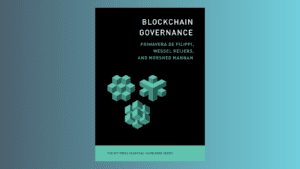 Blockchain Constitutionalism, Books, PublicationsBlockchain Governance | MIT Press Essential Knowledge VolumeBlockchain Governance
By Primavera de Fillippi, Wessel Reijers, Morshed Mannan
An engaging and comprehensive exploration of how fundamental ideas in political and legal thought shape the governance of blockchain communities, and are, in turn, shaped by blockchain technology.
How can digital cash truly be “trustless”? What does it mean that blockchain offers a new paradigm of the “rule of code”? How are decisions made when a blockchain system faces an emergency, and who gets to make those decisions? In Blockchain Governance, Primavera De Filippi, Wessel Reijers, and Morshed Mannan offer answers to these questions and more, in an accessible, critical overview of legal and political issues related to blockchain technology, now the foundation of a multi-billion-dollar industry. Moving beyond the hype, they show how blockchain offers fertile ground for experimentation with radically new ways to govern people and institutions.Blockchain-based systems, like Bitcoin, Ethereum, Tezos, and countless others, offer new ways of organizing digital cash, “smart” contracts to execute transactions, non-fungible tokens (NFTs) to collect art, and decentralized autonomous organizations (DAOs) to coordinate humans and machines. What these applications have in common is that they govern the behavior of people and artificial agents through distributed systems. Drawing from their extensive experience in researching blockchain technologies and communities, the authors discuss the origins of Bitcoin in cypher-anarchism and extropianism, spectacular events like the million-dollar theft of the DAO Attack, and the hostile takeover of the Steem platform. While engaging with political and legal thinkers such as Hobbes, Kelsen, and the Ostroms, these narratives explore how blockchain governance problematizes fundamental concepts such as rule of law, sovereignty, legality, legitimacy, and polycentric governance.The book is the result of years of extensive research in blockchain technologies and communities and it feels like an excellent introduction to Blockchain Gov’s research work on decentralized governance. Get the book at this link and find the audiobook version on Audible! [...]
Blockchain Constitutionalism, Books, PublicationsBlockchain Governance | MIT Press Essential Knowledge VolumeBlockchain Governance
By Primavera de Fillippi, Wessel Reijers, Morshed Mannan
An engaging and comprehensive exploration of how fundamental ideas in political and legal thought shape the governance of blockchain communities, and are, in turn, shaped by blockchain technology.
How can digital cash truly be “trustless”? What does it mean that blockchain offers a new paradigm of the “rule of code”? How are decisions made when a blockchain system faces an emergency, and who gets to make those decisions? In Blockchain Governance, Primavera De Filippi, Wessel Reijers, and Morshed Mannan offer answers to these questions and more, in an accessible, critical overview of legal and political issues related to blockchain technology, now the foundation of a multi-billion-dollar industry. Moving beyond the hype, they show how blockchain offers fertile ground for experimentation with radically new ways to govern people and institutions.Blockchain-based systems, like Bitcoin, Ethereum, Tezos, and countless others, offer new ways of organizing digital cash, “smart” contracts to execute transactions, non-fungible tokens (NFTs) to collect art, and decentralized autonomous organizations (DAOs) to coordinate humans and machines. What these applications have in common is that they govern the behavior of people and artificial agents through distributed systems. Drawing from their extensive experience in researching blockchain technologies and communities, the authors discuss the origins of Bitcoin in cypher-anarchism and extropianism, spectacular events like the million-dollar theft of the DAO Attack, and the hostile takeover of the Steem platform. While engaging with political and legal thinkers such as Hobbes, Kelsen, and the Ostroms, these narratives explore how blockchain governance problematizes fundamental concepts such as rule of law, sovereignty, legality, legitimacy, and polycentric governance.The book is the result of years of extensive research in blockchain technologies and communities and it feels like an excellent introduction to Blockchain Gov’s research work on decentralized governance. Get the book at this link and find the audiobook version on Audible! [...]
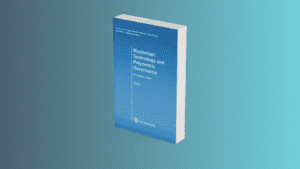 News, Polycentrism, Publications, ReportsBlockchain Technology and Polycentric Governance – A research reportBlockchain Technology and Polycentric Governance - A Research Report
Download the report here.
This report, released in its final version in July 2024, addresses the polycentric governance of blockchain systems, following conversations held from September 2022 until September 2023 by a reading group of blockchain practitioners and academics. The ERC-funded BlockchainGov project led the reading group. Since the publication of the Bitcoin whitepaper in 2008, blockchain technology has gained increasing popularity for being a “decentralized” ledger of transactions. Collectives of people have formed to discuss and decide on—to “govern”—the evolution of blockchain networks and blockchain-based applications, creating what we refer to as “blockchain systems.” While much literature is dedicated to understanding the governance of blockchain systems, no substantial efforts have been made to apply the concept of “polycentricity” to blockchain governance. Polycentric governance systems are characterized by multiple autonomous decision-making centers with overlapping areas of responsibility, which both compete and cooperate within a common overarching system of commonly agreed-upon rules, spontaneously or deliberately generating a shared social order. A term initially presented by Michael Polanyi and famously further developed by Vincent and Elinor Ostrom, polycentricity allows us to understand blockchain systems’ structure, process, and outcome. [...]
News, Polycentrism, Publications, ReportsBlockchain Technology and Polycentric Governance – A research reportBlockchain Technology and Polycentric Governance - A Research Report
Download the report here.
This report, released in its final version in July 2024, addresses the polycentric governance of blockchain systems, following conversations held from September 2022 until September 2023 by a reading group of blockchain practitioners and academics. The ERC-funded BlockchainGov project led the reading group. Since the publication of the Bitcoin whitepaper in 2008, blockchain technology has gained increasing popularity for being a “decentralized” ledger of transactions. Collectives of people have formed to discuss and decide on—to “govern”—the evolution of blockchain networks and blockchain-based applications, creating what we refer to as “blockchain systems.” While much literature is dedicated to understanding the governance of blockchain systems, no substantial efforts have been made to apply the concept of “polycentricity” to blockchain governance. Polycentric governance systems are characterized by multiple autonomous decision-making centers with overlapping areas of responsibility, which both compete and cooperate within a common overarching system of commonly agreed-upon rules, spontaneously or deliberately generating a shared social order. A term initially presented by Michael Polanyi and famously further developed by Vincent and Elinor Ostrom, polycentricity allows us to understand blockchain systems’ structure, process, and outcome. [...]
 Blockchain Constitutionalism, News, Publications, ReportsThe Blockchain Governance Toolkit – A Cookbook for a Resilient and Robust EcosystemThe Blockchain Governance Toolkit - A Cookbook for a Resilient and Robust Ecosystem
Download the report here. BlockchainGov works to support and guide decentralized communities in the process of choosing and implementing their own mechanism of distributed governance.BlockchainGov has embarked with Project Liberty Institute on year-long research initiative on the governance of blockchain networks and decentralized systems, exploring ways for communities to design governance models that allow people to be represented and express their voices. Today our collaborative endeavor culminate with “The Blockchain Governance Toolkit – A Cookbook for a Resilient and Robust Ecosystem”! After investigating the governance dynamics of 11 leading blockchain networks, this toolkit translates our insights into actionable tools and recommendations aiming to pave the way for a more equitable and sustainable technological ecosystem, at large.Through this toolkit, we aim to help governance designers develop resilient and robust governance systems for their respective blockchain networks, considering their respective preferences, goals, and contexts.We decided to structure this report as a toolkit (a cookbook) rather than a technical manual so that we can present multiple governance solutions (recipes), each with their unique features (flavors). We articulated five steps for a better governance:Step #1 – Blockchain governance requires balancing trade-offs. One must start by picking flavors. Expediency or Participation? Immutability or Adaptability? Determinism or Discretion?Step #2 – Governance primitives enable desired designs. Now, pick your ingredients! Expedient → participatory: multi-signature councils to plural voting. Immutable → adaptable: exit-only systems to improvement proposals. Deterministic → discretionary: self-executing systems to rough consensus.Step #3 – Resilient governance involves balancing preferences. Strong flavors in check! Adopt power checks for expedient systems and hard forking for immutable systems. You can use blockchain constitutions for adaptable systems or on-chain time-delay for heavily deterministic systems.Step #4 – Feedback loops are crucial for refining blockchain governance. Keep improving your recipe! Feedback loops should leverage humans as sensors, especially in systems where technology and society mix in complex ways, such as blockchain governance systems.Step #5 – Pick up a legal entity. Now food is ready and must be served! Legal entities aid blockchain participants in balancing ’embeddedness’ and ‘disembeddedness’. By possessing separate legal personalities, they can engage in contracts, own assets, and shield entities from creditors, ensuring both ‘entity’ and ‘owner’ protection.Hungry for more choice and voice in the technology that impacts your daily life? Have a look at our Blockchain Governance Design Cookbook! [...]
Blockchain Constitutionalism, News, Publications, ReportsThe Blockchain Governance Toolkit – A Cookbook for a Resilient and Robust EcosystemThe Blockchain Governance Toolkit - A Cookbook for a Resilient and Robust Ecosystem
Download the report here. BlockchainGov works to support and guide decentralized communities in the process of choosing and implementing their own mechanism of distributed governance.BlockchainGov has embarked with Project Liberty Institute on year-long research initiative on the governance of blockchain networks and decentralized systems, exploring ways for communities to design governance models that allow people to be represented and express their voices. Today our collaborative endeavor culminate with “The Blockchain Governance Toolkit – A Cookbook for a Resilient and Robust Ecosystem”! After investigating the governance dynamics of 11 leading blockchain networks, this toolkit translates our insights into actionable tools and recommendations aiming to pave the way for a more equitable and sustainable technological ecosystem, at large.Through this toolkit, we aim to help governance designers develop resilient and robust governance systems for their respective blockchain networks, considering their respective preferences, goals, and contexts.We decided to structure this report as a toolkit (a cookbook) rather than a technical manual so that we can present multiple governance solutions (recipes), each with their unique features (flavors). We articulated five steps for a better governance:Step #1 – Blockchain governance requires balancing trade-offs. One must start by picking flavors. Expediency or Participation? Immutability or Adaptability? Determinism or Discretion?Step #2 – Governance primitives enable desired designs. Now, pick your ingredients! Expedient → participatory: multi-signature councils to plural voting. Immutable → adaptable: exit-only systems to improvement proposals. Deterministic → discretionary: self-executing systems to rough consensus.Step #3 – Resilient governance involves balancing preferences. Strong flavors in check! Adopt power checks for expedient systems and hard forking for immutable systems. You can use blockchain constitutions for adaptable systems or on-chain time-delay for heavily deterministic systems.Step #4 – Feedback loops are crucial for refining blockchain governance. Keep improving your recipe! Feedback loops should leverage humans as sensors, especially in systems where technology and society mix in complex ways, such as blockchain governance systems.Step #5 – Pick up a legal entity. Now food is ready and must be served! Legal entities aid blockchain participants in balancing ’embeddedness’ and ‘disembeddedness’. By possessing separate legal personalities, they can engage in contracts, own assets, and shield entities from creditors, ensuring both ‘entity’ and ‘owner’ protection.Hungry for more choice and voice in the technology that impacts your daily life? Have a look at our Blockchain Governance Design Cookbook! [...]
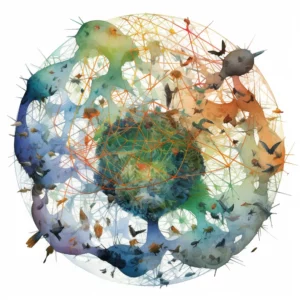 Blog posts, Coordi-Nations, PublicationsCoordi-nations: A New Institutional Structure for Global CooperationCoordi-nation: A New Institutional Structure for Global Cooperation
Primavera de Filippi and Jessy Kate Schingler, June 13, 2023.
Introduction
Networked communications have enabled new ways for people to coordinate and to engage in collective action, achieving shared goals and upholding shared values. Meanwhile, existing governance institutions — including governments and nation states — are failing to keep up with the changes brought about by these networked technologies. In this essay, we elaborate upon the notion of “coordi-nations” as a new type of organizational structure that can foster cooperation at a (local and) global scale, through shared values and participatory decision-making. Coordi-nations are a new form of network sovereignty that spans traditional geographical boundaries. By harnessing the power of digital communities and modern information technologies, coordi-nations provide innovative solutions to complex global coordination challenges, by promoting cooperation and acknowledging interdependencies amongst transnational communities.
The Limitations of States
“Nation-states fail when they are consumed by internal violence and cease delivering positive political goods to their inhabitants. Their governments lose credibility, and the continuing nature of the particular nation- state itself becomes questionable and illegitimate in the hearts and minds of its citizens. The rise and fall of nation-states is not new, but in a modern era when national states constitute the building blocks of world order, the violent disintegration and palpable weakness of selected African, Asian, Oceanic, and Latin American states threaten the very foundation of that system.” — Rotberg R (2003), ‘The Failure and Collapse of Nation-States: Breakdown, Prevention, and Repair’, in ‘When States Fail: Causes and Consequences’
Nation-states, despite their historical significance, are politically hegemonic structures that are failing to keep up with the changes brought on by networked communication and globalization. Membership in traditional nation-states is determined by blood or by land, without easy mechanisms to opt-in or opt-out. Citizenship within the framework of the state often requires choosing a single one, such that pluralistic allegiances and protections are rarely possible. States struggle to address global challenges (such as climate change) or challenges where cooperation is needed beyond national borders. Territorially-bound governance and sovereignty have contributed to institutional inertia, especially in the international arena, leading to a significant erosion of trust in many state institutions, and a decreasing sense of agency and shared identity among individual citizens.
The Emergence of Coordinations
Coordi-nations are a new institutional structure that offers an innovative and collaborative approach to global cooperation and coordination. They tap into the potential of information and communication technologies, providing opportunities for global governance and collective agency that were previously unexplored. Coordi-nations do not seek to replace the institution of the “state” but rather offer a new take on the existing concept of the “nation” that supports and cultivates emergent networked identities (i.e. digital nations). Coordi-nations rely on modern information and communication technologies to create new infrastructures of sovereignty, which allows for the progressive evolution and independent spheres of operation over time.
Coordi-nations versus Traditional Nations
Although coordi-nations are organized around features such as kinship, shared identity, and belonging that have nation-like qualities, they also differ from the traditional concept of national identity in several ways.
Nations are often territorially bound, and membership is generally determined by birthright (although mechanisms for opt-in citizenship also exist). Coordi-nations are non-territorial in nature; they form through voluntary association, shared values, and mutualism, rather than geographic boundaries or inherited identity. People voluntarily join or associate with one or more coordi-nations based on their affinity with that coordination’s activities and values.
As opposed to traditional nations — many of which govern themselves through the centralized institutions of the state — coordi-nations prioritize participatory governance and decentralized decision-making in a self contained domain that exists in parallel to the state.
Traditional national identity is perceived as a singular, overarching organizing principle of a person’s identity, whereas coordi-nations recognize and embrace plurality. Individuals can identify with multiple coordi-nations, allowing for the coexistence of multiple identities.
Coordi-nations vs Balaji’s Network State
Coordi-nations share some similarities with Balaji Srinivasan’s concept of the Network State. They both relate to alternative forms of governance and coordination beyond the Westphalian state system, and both are forms of network sovereignties that respond to the new capacities enabled by modern information and communications technologies. However, they also differ in their underlying principles and approaches in certain important ways:
Scope: Balaji’s conceptualisation of the network state envisions a comprehensive replacement or alternative to traditional nation-states. It seeks to create a parallel state infrastructure that operates through digital networks and platforms. Coordi-nations, on the other hand, do not necessarily aim to replace nation-states but rather explore new ways in which existing and emerging network sovereignties can be supported or formed via digital technologies. Coordi-nations introduce new layers of sovereignty that are not inherently territorial.
Approach to Identity: Balaji’s network state concept does not specifically address the formation of collective identities or national identities, but rather focuses on the use of technology to coordinate groups of aligned individuals. Coordi-nations, on the other hand, emphasize the endogenous formation of collective identities and belonging as a defining criteria, based on shared values, solidarity, mutualization, agentic governance and voluntary association.
Technological Emphasis: Balaji Srinivasan’s network state concept heavily relies on technology, particularly blockchain and digital platforms, to enable new forms of governance and coordination. It envisions the use of digital currencies, smart contracts, and decentralized applications as core infrastructure of the network state. Coordi-nations may rely on blockchain technology to the extent that it is instrumental to facilitate the governance of new networked identities, in a way that is more compatible with the principles of self-sovereignty and self-determination.
Relationship to Existing Institutions: With his definition of the network state, Balaji does not propose a significant departure from the institutional form of the state. Coordi-nations, on the other hand, do not seek to replicate the existing institutional form of the state, but rather aim to support and cultivate new layers of sovereignty associated with networks. Coordi-nations cultivate opportunities for mutualism and solidarity outside the framework of existing institutions, without necessarily competing with them. Yet, insofar as both network states and coordi-nations can acquire diplomatic recognition by other states, both could potentially enter into partnership with other nation states and other relevant actors in international relations.
Defining Features of Coordi-nations
Coordi-nations are an emergent form of networked sovereignty. They rely on networked communities as an animating force for cooperation, collaboration, mutualism and solidarity in a context of growing global interdependencies. The growth of networked communities may have significant implications for global governance, global trade and mobility.While every coord-nation will be different, there are certain defining features that they all share in common. Coordi-nations are designed around voluntary association and participatory governance. The nodes of a coordi-nation have achieved a certain level of self-regulation (autopoiesis) in the provision of internal needs (mutualization), before entering into relationships with other nodes. This ensures that nodes enter into relationships with other nodes in the coordi-nation based on their own agency and effective governance.The network aspect of the coordi-nation emerges from a bottom-up process of “supersidiarity” where nodes willingly decide to mutualize resources at the network level, as a means to facilitate and embrace a reciprocal interdependence. As a result of this process, the sense of identity and belonging grows to include the network level as well as the node. Individual nodes are not subsumed by the network; rather they become the constitutive parts of the network.Through this collectivization and mutualisation of resources, coordi-nations reduce incentives for free-riding, creating “economies of scope” where all nodes are better off than they would be otherwise, and the successes or advancements of any one node will have positive repercussions on the coordi-nation as a whole.Coordi-nations do not leverage economies of scale for their own growth, but rather expand through a process of fractal replication and interconnection between nodes that share similar cultural and functional patterns. This creates an implicit literacy between nodes that reduces the overhead for interaction, collaboration and cross-pollination, creating a recognizable “pattern integrity” across the network as a whole.Finally, coordi-nations are autopoietic systems that are operationally closed but cognitively open to interface with the external environment. They create symbiotic relationships with the outside world, seeking new ways to exchange resources, people and ideas with external systems. This produces learning loops thereby allowing for the coordi-nation to constantly adapt and innovate.
The recipe for creating a coordi-nation has 7 steps
Build or Join a Community of Kinship: find or found a community that purports to fulfill the needs of its members through participatory governance and voluntary participation.Identify other related or resonating communities: find communities that share the same “pattern integrity.”Encourage these communities to support one another: explore bilateral or multilateral collaborations across communities that are mutually beneficial.Create a collective identity, by naming it into existence: the act of naming creates a referent that catalyzes the process of identity formation, both from within and from outside the collective.Pool resources in common and collectively manage them: delegate and redistribute resources endogenously within the network through a process of super-sidiarity. This requires establishing a governance structure for the management of the resources held in common.Organize into a group capable of collective action: leverage capacities and common resources to operate exogenously. The collective becomes an agent acting on its own behalf, with its own resources and identity.Increase interdependence by interweaving communities: nodes in the network share forms of equity with one another, thereby increasing the costs of exit and ensuring the long-term sustainability of a collective that is greater than the sum of its part. Allow for processes of mutual adjustment that allow for stable formations to emerge at the network level.
Coordi-nations and Institutional Scaffolding
Coordi-nations rely on new forms of institutional scaffolding in order to support the governance of new types of ‘networked’ nations. These institutional structures may look very different from the familiar infrastructure of the state. By emphasizing bottom-up supersidiarity, adaptability, and interconnectedness, coordi-nations allow for the creation of new layers of sovereignties that operate independently of existing nation states , yet nonetheless maintain an interface and symbiotic relationship with the existing state system.Exclosures are institutional rules the sole purpose of which are to protect particular community dynamics from the institutional environment around it. An exclosure leverages the rules of a particular system in order to build a protective membrane that prevents the institution from trespassing into this newly carved out territory. The power of an exclosure is that it speaks the same language (or ruleset) as the institutional enclosures that it tries to escape from, creating a “fence within a fence”. Thus, the only way for the surrounding system to reach inside the exclosure would be for it to break its own rules.Exclosures can be a useful way for coordi-nations to coexist with existing nation states by carving out space for experimenting with new power structures and governance models based on autonomy and self-determination, while still maintaining connections and engaging in constructive relationships with existing nation states. Specifically, exclosures can be instrumental to coordi-nations in the following ways:Testing and Prototyping: Coordi-nations require the flexibility to test and prototype different forms of governance and organization. Exclosures allow them to create and operate in specific domains independent of territorial laws and regulations, creating an environment conducive to experimentation. These innovations can potentially influence and inspire broader societal and governmental systems, contributing to the evolution of governance structures at all levels.Autonomy and Self-Determination: Exclosures enable coordi-nations to establish their own set of rules and norms, allowing for members to collectively shape their desired system of governance. Autonomy ensures that the coordi-nation can align its practices and decision-making processes with the values and interests of its members without undue interference from external authorities.Flexibility and Adaptability: Exclosures provide coordi-nations with the flexibility to respond to changing circumstances and evolving needs. Coordinations remain agile and responsive, fostering their capacity to cooperate with other stakeholders, including nation-states, while maintaining their distinct identities and goals.
Conclusion
In conclusion, coordi-nations represent a new institutional structure that can act at the geopolitical level, and which can foster fractal cooperation at local and global scales. By addressing the limitations of the nation-state system and leveraging the opportunities presented by the networked communication, coordi-nations empower individuals, leverage symbiotic relationships with their external environment, enable mutualization, and facilitate collective action. Through bottom-up design, adaptability, and emphasis on opt-in participation, coordinations have the potential to address global challenges while cultivating agency and capacity for complex decision making, nurture diverse identities, and contribute to a more cooperative and collaborative society.
🌟🌟 Thank you to the numerous participants at the Zuzalu Coordi-nations Workshop who co-created these insights, and to Zuzalu for hosting us! With special thanks to Zarinah Agnew, Scott Moore, Noah Lee, Josh Davila, LauNaMu, Silke Noa, Lou de Kerhuelvez, Morshed Mannan, Michel Bauwens, and numerous others. [...]
Blog posts, Coordi-Nations, PublicationsCoordi-nations: A New Institutional Structure for Global CooperationCoordi-nation: A New Institutional Structure for Global Cooperation
Primavera de Filippi and Jessy Kate Schingler, June 13, 2023.
Introduction
Networked communications have enabled new ways for people to coordinate and to engage in collective action, achieving shared goals and upholding shared values. Meanwhile, existing governance institutions — including governments and nation states — are failing to keep up with the changes brought about by these networked technologies. In this essay, we elaborate upon the notion of “coordi-nations” as a new type of organizational structure that can foster cooperation at a (local and) global scale, through shared values and participatory decision-making. Coordi-nations are a new form of network sovereignty that spans traditional geographical boundaries. By harnessing the power of digital communities and modern information technologies, coordi-nations provide innovative solutions to complex global coordination challenges, by promoting cooperation and acknowledging interdependencies amongst transnational communities.
The Limitations of States
“Nation-states fail when they are consumed by internal violence and cease delivering positive political goods to their inhabitants. Their governments lose credibility, and the continuing nature of the particular nation- state itself becomes questionable and illegitimate in the hearts and minds of its citizens. The rise and fall of nation-states is not new, but in a modern era when national states constitute the building blocks of world order, the violent disintegration and palpable weakness of selected African, Asian, Oceanic, and Latin American states threaten the very foundation of that system.” — Rotberg R (2003), ‘The Failure and Collapse of Nation-States: Breakdown, Prevention, and Repair’, in ‘When States Fail: Causes and Consequences’
Nation-states, despite their historical significance, are politically hegemonic structures that are failing to keep up with the changes brought on by networked communication and globalization. Membership in traditional nation-states is determined by blood or by land, without easy mechanisms to opt-in or opt-out. Citizenship within the framework of the state often requires choosing a single one, such that pluralistic allegiances and protections are rarely possible. States struggle to address global challenges (such as climate change) or challenges where cooperation is needed beyond national borders. Territorially-bound governance and sovereignty have contributed to institutional inertia, especially in the international arena, leading to a significant erosion of trust in many state institutions, and a decreasing sense of agency and shared identity among individual citizens.
The Emergence of Coordinations
Coordi-nations are a new institutional structure that offers an innovative and collaborative approach to global cooperation and coordination. They tap into the potential of information and communication technologies, providing opportunities for global governance and collective agency that were previously unexplored. Coordi-nations do not seek to replace the institution of the “state” but rather offer a new take on the existing concept of the “nation” that supports and cultivates emergent networked identities (i.e. digital nations). Coordi-nations rely on modern information and communication technologies to create new infrastructures of sovereignty, which allows for the progressive evolution and independent spheres of operation over time.
Coordi-nations versus Traditional Nations
Although coordi-nations are organized around features such as kinship, shared identity, and belonging that have nation-like qualities, they also differ from the traditional concept of national identity in several ways.
Nations are often territorially bound, and membership is generally determined by birthright (although mechanisms for opt-in citizenship also exist). Coordi-nations are non-territorial in nature; they form through voluntary association, shared values, and mutualism, rather than geographic boundaries or inherited identity. People voluntarily join or associate with one or more coordi-nations based on their affinity with that coordination’s activities and values.
As opposed to traditional nations — many of which govern themselves through the centralized institutions of the state — coordi-nations prioritize participatory governance and decentralized decision-making in a self contained domain that exists in parallel to the state.
Traditional national identity is perceived as a singular, overarching organizing principle of a person’s identity, whereas coordi-nations recognize and embrace plurality. Individuals can identify with multiple coordi-nations, allowing for the coexistence of multiple identities.
Coordi-nations vs Balaji’s Network State
Coordi-nations share some similarities with Balaji Srinivasan’s concept of the Network State. They both relate to alternative forms of governance and coordination beyond the Westphalian state system, and both are forms of network sovereignties that respond to the new capacities enabled by modern information and communications technologies. However, they also differ in their underlying principles and approaches in certain important ways:
Scope: Balaji’s conceptualisation of the network state envisions a comprehensive replacement or alternative to traditional nation-states. It seeks to create a parallel state infrastructure that operates through digital networks and platforms. Coordi-nations, on the other hand, do not necessarily aim to replace nation-states but rather explore new ways in which existing and emerging network sovereignties can be supported or formed via digital technologies. Coordi-nations introduce new layers of sovereignty that are not inherently territorial.
Approach to Identity: Balaji’s network state concept does not specifically address the formation of collective identities or national identities, but rather focuses on the use of technology to coordinate groups of aligned individuals. Coordi-nations, on the other hand, emphasize the endogenous formation of collective identities and belonging as a defining criteria, based on shared values, solidarity, mutualization, agentic governance and voluntary association.
Technological Emphasis: Balaji Srinivasan’s network state concept heavily relies on technology, particularly blockchain and digital platforms, to enable new forms of governance and coordination. It envisions the use of digital currencies, smart contracts, and decentralized applications as core infrastructure of the network state. Coordi-nations may rely on blockchain technology to the extent that it is instrumental to facilitate the governance of new networked identities, in a way that is more compatible with the principles of self-sovereignty and self-determination.
Relationship to Existing Institutions: With his definition of the network state, Balaji does not propose a significant departure from the institutional form of the state. Coordi-nations, on the other hand, do not seek to replicate the existing institutional form of the state, but rather aim to support and cultivate new layers of sovereignty associated with networks. Coordi-nations cultivate opportunities for mutualism and solidarity outside the framework of existing institutions, without necessarily competing with them. Yet, insofar as both network states and coordi-nations can acquire diplomatic recognition by other states, both could potentially enter into partnership with other nation states and other relevant actors in international relations.
Defining Features of Coordi-nations
Coordi-nations are an emergent form of networked sovereignty. They rely on networked communities as an animating force for cooperation, collaboration, mutualism and solidarity in a context of growing global interdependencies. The growth of networked communities may have significant implications for global governance, global trade and mobility.While every coord-nation will be different, there are certain defining features that they all share in common. Coordi-nations are designed around voluntary association and participatory governance. The nodes of a coordi-nation have achieved a certain level of self-regulation (autopoiesis) in the provision of internal needs (mutualization), before entering into relationships with other nodes. This ensures that nodes enter into relationships with other nodes in the coordi-nation based on their own agency and effective governance.The network aspect of the coordi-nation emerges from a bottom-up process of “supersidiarity” where nodes willingly decide to mutualize resources at the network level, as a means to facilitate and embrace a reciprocal interdependence. As a result of this process, the sense of identity and belonging grows to include the network level as well as the node. Individual nodes are not subsumed by the network; rather they become the constitutive parts of the network.Through this collectivization and mutualisation of resources, coordi-nations reduce incentives for free-riding, creating “economies of scope” where all nodes are better off than they would be otherwise, and the successes or advancements of any one node will have positive repercussions on the coordi-nation as a whole.Coordi-nations do not leverage economies of scale for their own growth, but rather expand through a process of fractal replication and interconnection between nodes that share similar cultural and functional patterns. This creates an implicit literacy between nodes that reduces the overhead for interaction, collaboration and cross-pollination, creating a recognizable “pattern integrity” across the network as a whole.Finally, coordi-nations are autopoietic systems that are operationally closed but cognitively open to interface with the external environment. They create symbiotic relationships with the outside world, seeking new ways to exchange resources, people and ideas with external systems. This produces learning loops thereby allowing for the coordi-nation to constantly adapt and innovate.
The recipe for creating a coordi-nation has 7 steps
Build or Join a Community of Kinship: find or found a community that purports to fulfill the needs of its members through participatory governance and voluntary participation.Identify other related or resonating communities: find communities that share the same “pattern integrity.”Encourage these communities to support one another: explore bilateral or multilateral collaborations across communities that are mutually beneficial.Create a collective identity, by naming it into existence: the act of naming creates a referent that catalyzes the process of identity formation, both from within and from outside the collective.Pool resources in common and collectively manage them: delegate and redistribute resources endogenously within the network through a process of super-sidiarity. This requires establishing a governance structure for the management of the resources held in common.Organize into a group capable of collective action: leverage capacities and common resources to operate exogenously. The collective becomes an agent acting on its own behalf, with its own resources and identity.Increase interdependence by interweaving communities: nodes in the network share forms of equity with one another, thereby increasing the costs of exit and ensuring the long-term sustainability of a collective that is greater than the sum of its part. Allow for processes of mutual adjustment that allow for stable formations to emerge at the network level.
Coordi-nations and Institutional Scaffolding
Coordi-nations rely on new forms of institutional scaffolding in order to support the governance of new types of ‘networked’ nations. These institutional structures may look very different from the familiar infrastructure of the state. By emphasizing bottom-up supersidiarity, adaptability, and interconnectedness, coordi-nations allow for the creation of new layers of sovereignties that operate independently of existing nation states , yet nonetheless maintain an interface and symbiotic relationship with the existing state system.Exclosures are institutional rules the sole purpose of which are to protect particular community dynamics from the institutional environment around it. An exclosure leverages the rules of a particular system in order to build a protective membrane that prevents the institution from trespassing into this newly carved out territory. The power of an exclosure is that it speaks the same language (or ruleset) as the institutional enclosures that it tries to escape from, creating a “fence within a fence”. Thus, the only way for the surrounding system to reach inside the exclosure would be for it to break its own rules.Exclosures can be a useful way for coordi-nations to coexist with existing nation states by carving out space for experimenting with new power structures and governance models based on autonomy and self-determination, while still maintaining connections and engaging in constructive relationships with existing nation states. Specifically, exclosures can be instrumental to coordi-nations in the following ways:Testing and Prototyping: Coordi-nations require the flexibility to test and prototype different forms of governance and organization. Exclosures allow them to create and operate in specific domains independent of territorial laws and regulations, creating an environment conducive to experimentation. These innovations can potentially influence and inspire broader societal and governmental systems, contributing to the evolution of governance structures at all levels.Autonomy and Self-Determination: Exclosures enable coordi-nations to establish their own set of rules and norms, allowing for members to collectively shape their desired system of governance. Autonomy ensures that the coordi-nation can align its practices and decision-making processes with the values and interests of its members without undue interference from external authorities.Flexibility and Adaptability: Exclosures provide coordi-nations with the flexibility to respond to changing circumstances and evolving needs. Coordinations remain agile and responsive, fostering their capacity to cooperate with other stakeholders, including nation-states, while maintaining their distinct identities and goals.
Conclusion
In conclusion, coordi-nations represent a new institutional structure that can act at the geopolitical level, and which can foster fractal cooperation at local and global scales. By addressing the limitations of the nation-state system and leveraging the opportunities presented by the networked communication, coordi-nations empower individuals, leverage symbiotic relationships with their external environment, enable mutualization, and facilitate collective action. Through bottom-up design, adaptability, and emphasis on opt-in participation, coordinations have the potential to address global challenges while cultivating agency and capacity for complex decision making, nurture diverse identities, and contribute to a more cooperative and collaborative society.
🌟🌟 Thank you to the numerous participants at the Zuzalu Coordi-nations Workshop who co-created these insights, and to Zuzalu for hosting us! With special thanks to Zarinah Agnew, Scott Moore, Noah Lee, Josh Davila, LauNaMu, Silke Noa, Lou de Kerhuelvez, Morshed Mannan, Michel Bauwens, and numerous others. [...]
 News, Publications, ReportsProof of Humanity: Ethnographic Research of a “democratic” DAOProof of Humanity: Ethnographic Research of a “democratic” DAO
Jamilya Kamalova, Sofia Cossar, Tara Merk.In early 2021, the first Sybil-resistant registry of humans was launched. The Proof of Humanity (PoH) registry and the PoH DAO is the first decentralized autonomous organization democratically governed running on the Ethereum network. To help us conduct this research, we relied on academic articles from a lot of different disciplines, such as political science, digital ethnography, democratic theory (especially literature conceptualizing Western liberal democracies to make sense of our empirical observations and findings), but also studies on blockchain systems and blockchain-based governance.The problem of this research is: What governance dynamics led to the Proof of Humanity DAO’s crisis and decision to fork?Our theory was that such a decision came from a persistent governance crisis caused by the absence of strong democratic elements, procedures, regulations, and institutions that could have supported the coexistence of its diverse community rather than leading to its growing and ultimately irreparable division. So we conducted this ethnographic study involving online observation, interviews, events, and institutional analysis. Participants signed community consent forms under BlockchainGov’s research ethics, approved by EUI/CERSA, and agreed to the use and publication of data collected about the PoH DAO community for this research project.Now, in March 2024, we are releasing an updated version of the research, integrating the feedback received from the community on the originally presented findings.Read the paper to discover more about our findings! This document is available in English and Spanish.Download the report here.
Continue reading [...]
News, Publications, ReportsProof of Humanity: Ethnographic Research of a “democratic” DAOProof of Humanity: Ethnographic Research of a “democratic” DAO
Jamilya Kamalova, Sofia Cossar, Tara Merk.In early 2021, the first Sybil-resistant registry of humans was launched. The Proof of Humanity (PoH) registry and the PoH DAO is the first decentralized autonomous organization democratically governed running on the Ethereum network. To help us conduct this research, we relied on academic articles from a lot of different disciplines, such as political science, digital ethnography, democratic theory (especially literature conceptualizing Western liberal democracies to make sense of our empirical observations and findings), but also studies on blockchain systems and blockchain-based governance.The problem of this research is: What governance dynamics led to the Proof of Humanity DAO’s crisis and decision to fork?Our theory was that such a decision came from a persistent governance crisis caused by the absence of strong democratic elements, procedures, regulations, and institutions that could have supported the coexistence of its diverse community rather than leading to its growing and ultimately irreparable division. So we conducted this ethnographic study involving online observation, interviews, events, and institutional analysis. Participants signed community consent forms under BlockchainGov’s research ethics, approved by EUI/CERSA, and agreed to the use and publication of data collected about the PoH DAO community for this research project.Now, in March 2024, we are releasing an updated version of the research, integrating the feedback received from the community on the originally presented findings.Read the paper to discover more about our findings! This document is available in English and Spanish.Download the report here.
Continue reading [...]
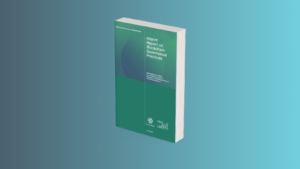 Blockchain Constitutionalism, News, Publications, ReportsInterim Report on Blockchain GovernanceInterim Report on Blockchain Governance Practices
Download the report here. As decentralized technologies such as blockchain rapidly evolve, establishing effective governance models is crucial to guide stakeholders towards a sustainable and equitable digital future. To enhance understanding and promote responsible practices in this landscape, Project Liberty Institute and BlockchainGov have embarked on a multi stakeholder governance initiative on good governance for a responsible decentralized technological ecosystem. The first intermediary report compares for the first time governance mechanisms and dynamics across 11 major blockchain networks.
Using an interdisciplinary and comparative approach, the report explores prominent blockchain systems including Avalanche, Bitcoin, Cardano, Cosmos, Ethereum, Filecoin, Optimism, Polygon, Polkadot, Tezos, and Zcash. It examines these networks through a multidimensional governance taxonomy, collecting data through desk research and in-depth interviews with key stakeholders.
The Multi Stakeholder Council set up by Project Liberty and BlockchainGov for this Initiative has been instrumental in guiding the development of this report.
The analysis has uncovered six key findings related to the legal entities created to support blockchain networks, power distribution across governance areas and stakeholder groups, decentralization objectives and challenges, the interplay of on-chain code and off-chain practices in governance formalization, predominant decision-making mechanisms, and processes for handling security breaches.
The intermediary report highlights that while blockchain networks are technically decentralized across nodes, their governance involves multiple layers. Hence determining influence requires scrutinizing the types of decisions being made, the stakeholders involved, and the specific mechanisms utilized. This understanding enables designing inclusive governance aligned with community values. The report also analyzes how governance comprises both on-chain protocol rules and off-chain social practices.
The key findings of this report will guide the formulation of good governance recommendations providing pragmatic guidance to stakeholders and the overall ecosystem of blockchain and decentralized technologies.
This pioneering comparison marks a milestone to advance the good governance of blockchain and decentralized technologies.
Project Liberty Institute and BlockchainGov, together with the members of the Initiative’s Governance Multi Stakeholder Council, will now, based on the findings of this comparative study, work on distilling recommendations for the forthcoming Manual on Best Practices for Blockchain and Decentralized Technologies, scheduled for release in April 2024.
[...]
Blockchain Constitutionalism, News, Publications, ReportsInterim Report on Blockchain GovernanceInterim Report on Blockchain Governance Practices
Download the report here. As decentralized technologies such as blockchain rapidly evolve, establishing effective governance models is crucial to guide stakeholders towards a sustainable and equitable digital future. To enhance understanding and promote responsible practices in this landscape, Project Liberty Institute and BlockchainGov have embarked on a multi stakeholder governance initiative on good governance for a responsible decentralized technological ecosystem. The first intermediary report compares for the first time governance mechanisms and dynamics across 11 major blockchain networks.
Using an interdisciplinary and comparative approach, the report explores prominent blockchain systems including Avalanche, Bitcoin, Cardano, Cosmos, Ethereum, Filecoin, Optimism, Polygon, Polkadot, Tezos, and Zcash. It examines these networks through a multidimensional governance taxonomy, collecting data through desk research and in-depth interviews with key stakeholders.
The Multi Stakeholder Council set up by Project Liberty and BlockchainGov for this Initiative has been instrumental in guiding the development of this report.
The analysis has uncovered six key findings related to the legal entities created to support blockchain networks, power distribution across governance areas and stakeholder groups, decentralization objectives and challenges, the interplay of on-chain code and off-chain practices in governance formalization, predominant decision-making mechanisms, and processes for handling security breaches.
The intermediary report highlights that while blockchain networks are technically decentralized across nodes, their governance involves multiple layers. Hence determining influence requires scrutinizing the types of decisions being made, the stakeholders involved, and the specific mechanisms utilized. This understanding enables designing inclusive governance aligned with community values. The report also analyzes how governance comprises both on-chain protocol rules and off-chain social practices.
The key findings of this report will guide the formulation of good governance recommendations providing pragmatic guidance to stakeholders and the overall ecosystem of blockchain and decentralized technologies.
This pioneering comparison marks a milestone to advance the good governance of blockchain and decentralized technologies.
Project Liberty Institute and BlockchainGov, together with the members of the Initiative’s Governance Multi Stakeholder Council, will now, based on the findings of this comparative study, work on distilling recommendations for the forthcoming Manual on Best Practices for Blockchain and Decentralized Technologies, scheduled for release in April 2024.
[...]
 Articles, Polycentrism, PublicationsAdaptive Governance for Blockchain NetworksAdaptive Governance for Blockchain Networks
Esen Esener
This research investigates adaptive governance for blockchain networks within the context of legal resilience by looking at the current regulatory trends in two major jurisdictions, the European Union and the United States. The paper explores the current stance of blockchain networks and regulations, and explains why alegality of blockchain networks is no longer a justifiable argument. It also finds that the current regulatory environment is not suitable for blockchain network compliance due to their properties, presenting an existential threat and fear of legal claims which may lead to full banning, criminal charges or a loss of user base. In order to address the threat, this research suggests that blockchain networks should develop legal resilience within their governance mechanisms. Later, the research investigates the theory of adaptive governance for the purpose of assessing its applicability to blockchain networks with the aim of helping them adapt to regulatory changes while staying decentralized. Lastly the paper makes seven recommendations to blockchain networks to consider for their governance and policies. [...]
Articles, Polycentrism, PublicationsAdaptive Governance for Blockchain NetworksAdaptive Governance for Blockchain Networks
Esen Esener
This research investigates adaptive governance for blockchain networks within the context of legal resilience by looking at the current regulatory trends in two major jurisdictions, the European Union and the United States. The paper explores the current stance of blockchain networks and regulations, and explains why alegality of blockchain networks is no longer a justifiable argument. It also finds that the current regulatory environment is not suitable for blockchain network compliance due to their properties, presenting an existential threat and fear of legal claims which may lead to full banning, criminal charges or a loss of user base. In order to address the threat, this research suggests that blockchain networks should develop legal resilience within their governance mechanisms. Later, the research investigates the theory of adaptive governance for the purpose of assessing its applicability to blockchain networks with the aim of helping them adapt to regulatory changes while staying decentralized. Lastly the paper makes seven recommendations to blockchain networks to consider for their governance and policies. [...]
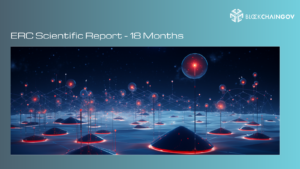 Publications, ReportsERC Scientific Report – 18 Months18 Months of ERC Grant - Bits from the Scientific Report
In 2023, BlokchainGov completed the first half of the three-year-long ERC grant. We were requested to report the achievements and goals of our project so far. We took the chance to reflect and look back at 1.5 years of experimentation and research in the space. This exercise was useful to summarize and recap the progress we made and the challenges we encountered in this time. We desire to share some bits from the Scientific Report to mark this moment in time.
Advancements in Blockchain Governance Research
What kind of progresses we made in our research? How did our findings influenced the premises and the methodologies of our research?
Unveiling Trust in Blockchain Systems:Beyond conventional trustless technology perceptions, our research exposes the persistence of trust in blockchain systems. This profound insight challenges existing notions and explores how trust can be leveraged to enhance governance structures.
Understanding Challenges in Distributed Governance:Challenging assumptions in early distributed governance literature, our research delves into the challenges faced by collaborative organizations. Apathy, technical constraints, and uneven participation emerge as critical issues that require proactive addressing for effective governance.
Tacit Governance Practices Revealed:Incorporating innovative ethnographic methods, including the telescope bot, our research uncovers the tacit and invisible governance practices underpinning many blockchain systems. This in-depth understanding enhances our knowledge of the intricacies involved in governing blockchain networks.
Token-Bound NFT License:Addressing critical issues in the NFT space, our research introduces the Token-Bound NFT License. This novel copyright license empowers NFT owners with comprehensive rights over associated creative works, tackling the separation of NFTs from the underlying content.
Pioneering New Network Sovereignties:Our project challenges traditional paradigms of Network States by proposing New Network Sovereignties. Based on commons-based principles, these non-state actors represent a new model for post-Westphalian global governance, sparking a reevaluation of international relations.
Alegality Paradigms :Alegal paradigms, a key focus of our research, redefine governance in the context of blockchain systems by navigating the space beyond conventional legality. In this innovative approach, actions within decentralized networks, such as smart contracts and DAOs, exist in regulatory gray areas, neither explicitly legal nor illegal. Alegal governance recognizes the unique features of blockchain, prompting a reassessment of regulatory frameworks. It advocates for a balanced approach that preserves the trust mechanisms inherent in decentralized systems while acknowledging the need for regulatory adaptation. This concept challenges traditional legal norms, paving the way for a governance paradigm that embraces the distinctive characteristics of blockchain technologies on a global scale.
Off Chain Constituzionalization:Recognizing the importance of off-chain constitutions for blockchain governance, we aim to challenge the prevailing focus on designing trustless systems and solve governance issues.
Societal Impacts and Global OutreachBlockhainGov’s work aims to impact the current blockchain landscape and to shape the evolution of both the technology and the culture surrounding it. Here are some of the ways in which we try to propagate our research in the space. Timely and Impactful Regulation. The case of DAO Model Law:Our work on the DAO Model Law significantly contributes to global discussions on DAO regulation. Striking a balance between public policy concerns and the unique features of blockchain systems, our approach influences legislative developments and broader public engagement with DAOs.Token-Bound NFT License and Regulatory Innovation:The aforementioned Token-Bound NFT License introduces a novel legal framework addressing copyright and ownership concerns in the NFT space. This innovation has the potential to reshape how NFT artists license their works and navigate legal considerations.Public Awareness Initiatives:Our team actively engages in initiatives to raise public awareness about blockchain governance and New Network Sovereignties. Through op-eds, blogs, and a podcast series (Overthrowing the Network State), we provide a nuanced perspective accessible to a broad audience.Co-Design for Improved Governance:Our research outcomes extend beyond academia, offering practical solutions and recommendations for industry practitioners. By collaborating and receiving feedback from industry stakeholders, we ensure that our work contributes to improving governance practices in the broader community. [...]
Publications, ReportsERC Scientific Report – 18 Months18 Months of ERC Grant - Bits from the Scientific Report
In 2023, BlokchainGov completed the first half of the three-year-long ERC grant. We were requested to report the achievements and goals of our project so far. We took the chance to reflect and look back at 1.5 years of experimentation and research in the space. This exercise was useful to summarize and recap the progress we made and the challenges we encountered in this time. We desire to share some bits from the Scientific Report to mark this moment in time.
Advancements in Blockchain Governance Research
What kind of progresses we made in our research? How did our findings influenced the premises and the methodologies of our research?
Unveiling Trust in Blockchain Systems:Beyond conventional trustless technology perceptions, our research exposes the persistence of trust in blockchain systems. This profound insight challenges existing notions and explores how trust can be leveraged to enhance governance structures.
Understanding Challenges in Distributed Governance:Challenging assumptions in early distributed governance literature, our research delves into the challenges faced by collaborative organizations. Apathy, technical constraints, and uneven participation emerge as critical issues that require proactive addressing for effective governance.
Tacit Governance Practices Revealed:Incorporating innovative ethnographic methods, including the telescope bot, our research uncovers the tacit and invisible governance practices underpinning many blockchain systems. This in-depth understanding enhances our knowledge of the intricacies involved in governing blockchain networks.
Token-Bound NFT License:Addressing critical issues in the NFT space, our research introduces the Token-Bound NFT License. This novel copyright license empowers NFT owners with comprehensive rights over associated creative works, tackling the separation of NFTs from the underlying content.
Pioneering New Network Sovereignties:Our project challenges traditional paradigms of Network States by proposing New Network Sovereignties. Based on commons-based principles, these non-state actors represent a new model for post-Westphalian global governance, sparking a reevaluation of international relations.
Alegality Paradigms :Alegal paradigms, a key focus of our research, redefine governance in the context of blockchain systems by navigating the space beyond conventional legality. In this innovative approach, actions within decentralized networks, such as smart contracts and DAOs, exist in regulatory gray areas, neither explicitly legal nor illegal. Alegal governance recognizes the unique features of blockchain, prompting a reassessment of regulatory frameworks. It advocates for a balanced approach that preserves the trust mechanisms inherent in decentralized systems while acknowledging the need for regulatory adaptation. This concept challenges traditional legal norms, paving the way for a governance paradigm that embraces the distinctive characteristics of blockchain technologies on a global scale.
Off Chain Constituzionalization:Recognizing the importance of off-chain constitutions for blockchain governance, we aim to challenge the prevailing focus on designing trustless systems and solve governance issues.
Societal Impacts and Global OutreachBlockhainGov’s work aims to impact the current blockchain landscape and to shape the evolution of both the technology and the culture surrounding it. Here are some of the ways in which we try to propagate our research in the space. Timely and Impactful Regulation. The case of DAO Model Law:Our work on the DAO Model Law significantly contributes to global discussions on DAO regulation. Striking a balance between public policy concerns and the unique features of blockchain systems, our approach influences legislative developments and broader public engagement with DAOs.Token-Bound NFT License and Regulatory Innovation:The aforementioned Token-Bound NFT License introduces a novel legal framework addressing copyright and ownership concerns in the NFT space. This innovation has the potential to reshape how NFT artists license their works and navigate legal considerations.Public Awareness Initiatives:Our team actively engages in initiatives to raise public awareness about blockchain governance and New Network Sovereignties. Through op-eds, blogs, and a podcast series (Overthrowing the Network State), we provide a nuanced perspective accessible to a broad audience.Co-Design for Improved Governance:Our research outcomes extend beyond academia, offering practical solutions and recommendations for industry practitioners. By collaborating and receiving feedback from industry stakeholders, we ensure that our work contributes to improving governance practices in the broader community. [...]
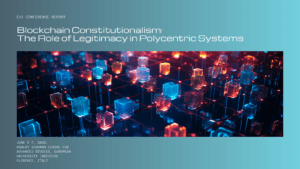 Blockchain Constitutionalism, Conference Organizations, News, Polycentrism, ReportsResearch Report – Blockchain Constitutionalism: The Role Of Legitimacy In Polycentric SystemsResearch Report - Blockchain Constitutionalism: The Role Of Legitimacy In Polycentric Systems
Primavera de Filippi, Morshed Mannan, Kelsie Nabben, Jamilya Kamalova, Sofia Cossar, Tara Merk, Silke Noa, Marco Crepaldi, Joshua Dávila.
Between 5 and 7 June 2023, BlockchainGov organized a conference on “Blockchain Constitutionalism: The Role of Legitimacy in Polycentric Systems” at the Robert Schuman Centre for Advanced Studies, European University Institute in Florence, Italy.
Blockchain networks and Decentralized Autonomous Organizations (DAOs) have seen a surge in adoption in recent years. To fulfill their promise of widespread structural innovation and change meaningfully, they require governance that maintains legitimacy for internal and external stakeholders. As permissionless, globe-spanning technologies with significant effects on the general public, there has been a growing interest in viewing these blockchain-based systems in constitutional terms.
Early analysis regarded the rules expressed through software code as a form of ‘on-chain constitution.’ At the same time, more recently, these have been supplemented with written documents that articulate additional rules and principles regarding the governance of the blockchain-based system (‘off-chain constitutions’). The common thread among the various examples of blockchain “constitutions” seems to be that they define aspects of a system’s decision-making process and make them relatively difficult to change. However, both blockchain practitioners and legal scholars do not agree on whether we should consider these as ‘constitutions’ or ‘constitutionalization’ processes in a strict sense, nor to what extent these efforts can render blockchain systems more legitimate.
The EUI Conference brought together experts, academics, and practitioners to explore this intersection. You can read the full report here. [...]
Blockchain Constitutionalism, Conference Organizations, News, Polycentrism, ReportsResearch Report – Blockchain Constitutionalism: The Role Of Legitimacy In Polycentric SystemsResearch Report - Blockchain Constitutionalism: The Role Of Legitimacy In Polycentric Systems
Primavera de Filippi, Morshed Mannan, Kelsie Nabben, Jamilya Kamalova, Sofia Cossar, Tara Merk, Silke Noa, Marco Crepaldi, Joshua Dávila.
Between 5 and 7 June 2023, BlockchainGov organized a conference on “Blockchain Constitutionalism: The Role of Legitimacy in Polycentric Systems” at the Robert Schuman Centre for Advanced Studies, European University Institute in Florence, Italy.
Blockchain networks and Decentralized Autonomous Organizations (DAOs) have seen a surge in adoption in recent years. To fulfill their promise of widespread structural innovation and change meaningfully, they require governance that maintains legitimacy for internal and external stakeholders. As permissionless, globe-spanning technologies with significant effects on the general public, there has been a growing interest in viewing these blockchain-based systems in constitutional terms.
Early analysis regarded the rules expressed through software code as a form of ‘on-chain constitution.’ At the same time, more recently, these have been supplemented with written documents that articulate additional rules and principles regarding the governance of the blockchain-based system (‘off-chain constitutions’). The common thread among the various examples of blockchain “constitutions” seems to be that they define aspects of a system’s decision-making process and make them relatively difficult to change. However, both blockchain practitioners and legal scholars do not agree on whether we should consider these as ‘constitutions’ or ‘constitutionalization’ processes in a strict sense, nor to what extent these efforts can render blockchain systems more legitimate.
The EUI Conference brought together experts, academics, and practitioners to explore this intersection. You can read the full report here. [...]
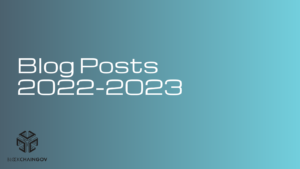 Blog postsBlog Posts 2022-2023Blog Posts 2022-2023
Our researchers’ network is publishing its work not only in academic journals but all around the Web. Here you can find a list of the most relevant blog posts from the last two years · 2023:· Lotti, L., Houde, N., Merk, T. (2033) “Web3 Work research report: The DAO contributor’s perspective” in Other Internet Substack.· De Filippi, P., Schingler, J.K, (2023) “Coordi-nations: a new institutional structure for Global Cooperation” in the Berkman-Klein Center blog, at Harvard.· Hubbard, S., Merk, T., Douglas, T. (2023) “DAO Harvard Event Recap” in Harvard Belfer Center Blog.· Lotti, L., Houde, N., Merk, T. (2033) “Making DAOs Work” in Other Internet Substack.· Merk, T., Lotti, L., Houde, N. (2023) “Introducing Web3 Work” in Other Internet Substack.· Merk, T. (2023) “Rewards Systems Galore: a gateway drug to fundamental discussions” in The DAOist Blog.· Merk, T. (2023) “Wild, wilder, what? – a structured way to exploring your wildest ideas in DAOs” in The DAOist Blog.· 2022:· De Filippi, P. (2022) “Blockchain technology as a means to create Virtual Property in the Metaverse” in OECD Forum Network.· Balazs, Bodo, De Filippi, P. (2022) “’Trust in Context: The Impact of Regulation on Blockchain and DeFi” in Oxford Business Law Blog (OBLB)· Merk, T., & Mam, J. (2022). “Introducing the DADA Exit to Community” in Dada.art. · Merk, T., Rennie, E., Miller, L. (2022) “Introduction and Documentation of the Telescope Bot” in The Metagovernance Project [...]
Blog postsBlog Posts 2022-2023Blog Posts 2022-2023
Our researchers’ network is publishing its work not only in academic journals but all around the Web. Here you can find a list of the most relevant blog posts from the last two years · 2023:· Lotti, L., Houde, N., Merk, T. (2033) “Web3 Work research report: The DAO contributor’s perspective” in Other Internet Substack.· De Filippi, P., Schingler, J.K, (2023) “Coordi-nations: a new institutional structure for Global Cooperation” in the Berkman-Klein Center blog, at Harvard.· Hubbard, S., Merk, T., Douglas, T. (2023) “DAO Harvard Event Recap” in Harvard Belfer Center Blog.· Lotti, L., Houde, N., Merk, T. (2033) “Making DAOs Work” in Other Internet Substack.· Merk, T., Lotti, L., Houde, N. (2023) “Introducing Web3 Work” in Other Internet Substack.· Merk, T. (2023) “Rewards Systems Galore: a gateway drug to fundamental discussions” in The DAOist Blog.· Merk, T. (2023) “Wild, wilder, what? – a structured way to exploring your wildest ideas in DAOs” in The DAOist Blog.· 2022:· De Filippi, P. (2022) “Blockchain technology as a means to create Virtual Property in the Metaverse” in OECD Forum Network.· Balazs, Bodo, De Filippi, P. (2022) “’Trust in Context: The Impact of Regulation on Blockchain and DeFi” in Oxford Business Law Blog (OBLB)· Merk, T., & Mam, J. (2022). “Introducing the DADA Exit to Community” in Dada.art. · Merk, T., Rennie, E., Miller, L. (2022) “Introduction and Documentation of the Telescope Bot” in The Metagovernance Project [...]
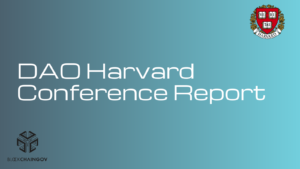 Conference Organizations, Events, PolycentrismDAO Harvard 2023DAO Harvard 2023
DAO Harvard took place on April 2-4, 2023 bringing together policymakers, blockchain experts and scholars to discuss and explore different aspects of Decentralized Autonomous Organizations. The conference was co-organized by Blockchain Gov alongside Harvard Kennedy School, Belfer Center, and the Safra Center for Ethics,as well as Metagov, COALA, and the DAO Research Collective. The event was organized in different tracks – Research Summit, Law Summit, and Summit on Equitable Ownership and Governance in the Online Economy.The Law SummitThe Law Summit at DAO Harvard featured multiple working groups focused on legal aspects of DAOs. They discussed topics like incorporation benefits, liability, taxation, legal pathways, and regulatory compliance standards. BlockchainGov and COALA co-organized the event, building on the COALA DAO Model Law. This model law offers guidelines for regulatory frameworks to provide legal clarity for DAOs while considering their unique characteristics. This approach has gained momentum, as seen in the passage of the Utah DAO Bill. Each group included legal experts, academics, and practitioners, and their insights will contribute to a revised COALA DAO Model Law (V2)On CostitutionalismIn the latter, Primavera De Filippi discussed the relationship between blockchains and constitutions, highlighting that decentralized technology doesn’t necessarily equate to decentralized power. Decentralization isn’t inherent; it must be intentionally designed, and it’s not always without costs. Blockchain systems incorporate both formal (on-chain protocols and smart contracts) and informal (off-chain rules) constitutions.Our friends at Belfer Center compiled a complete report at this link. [...]
Conference Organizations, Events, PolycentrismDAO Harvard 2023DAO Harvard 2023
DAO Harvard took place on April 2-4, 2023 bringing together policymakers, blockchain experts and scholars to discuss and explore different aspects of Decentralized Autonomous Organizations. The conference was co-organized by Blockchain Gov alongside Harvard Kennedy School, Belfer Center, and the Safra Center for Ethics,as well as Metagov, COALA, and the DAO Research Collective. The event was organized in different tracks – Research Summit, Law Summit, and Summit on Equitable Ownership and Governance in the Online Economy.The Law SummitThe Law Summit at DAO Harvard featured multiple working groups focused on legal aspects of DAOs. They discussed topics like incorporation benefits, liability, taxation, legal pathways, and regulatory compliance standards. BlockchainGov and COALA co-organized the event, building on the COALA DAO Model Law. This model law offers guidelines for regulatory frameworks to provide legal clarity for DAOs while considering their unique characteristics. This approach has gained momentum, as seen in the passage of the Utah DAO Bill. Each group included legal experts, academics, and practitioners, and their insights will contribute to a revised COALA DAO Model Law (V2)On CostitutionalismIn the latter, Primavera De Filippi discussed the relationship between blockchains and constitutions, highlighting that decentralized technology doesn’t necessarily equate to decentralized power. Decentralization isn’t inherent; it must be intentionally designed, and it’s not always without costs. Blockchain systems incorporate both formal (on-chain protocols and smart contracts) and informal (off-chain rules) constitutions.Our friends at Belfer Center compiled a complete report at this link. [...]
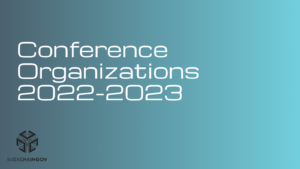 Conference Organizations, EventsConference Organizations Update 2022-23Conference Organizations Update 2022-23
We organized conferences, seminars and workshops as part of our research activity all over the world.
Conferences
2023:
Organizer of the conference on “Blockchain Constitutionalism: the Role of Legitimacy in Polycentric Systems” at European University Institute, 6-7 June 2023
Organizer of the Conference “Overthrowing the Network States with Coordi-Nations“ organized in collaboration with Zuzalu. Lustica Bay, Montenegro. May 16-18 2023
Co-organiser of the DAO Harvard Conference, organized in collaboration with the Harvard Kennedy School, Belfer Center, and the Safra Center for Ethics, as well as Metagov, COALA, and the DAO Research Collective. Harvard University. April 2-3-4, 2023.
2022:
Co-organiser of the conference “What’s Governing Web3? Advancing research on blockchain-enabled Web3 governance” organized in collaboration with RMIT at Melbourne University. 12-15 December 2022. Melbourne, Australia“
2021:
Co-organiser of the conference “La blockchain : enjeux juridiques, économiques, de sécurité et de coûts énergétiques” organised by CERSA and LITEM, in collaboration with CREIS-Terminal. 26 March 2021 (online).
Promoter and co-organiser of the conference “Blockchain, Imaginaires religieux et Théologie”, organized by le Collège des Bernardins. March 17 & 31, 2021 (online)
Workshops
2023:
Organizer of a workshop on “Blockchain Constitutionalism: the Role of Legitimacy in Polycentric Systems” at European University Institute, 5 June 2023
Co-organizer of “The Emergence of Platform Cooperatives. Values, Governance and Design” in collaboration with Scuola Normale Superiore. Florence, 16 May 2023.
Organizer of the “Overthrowing the Network State with Coordi-Nations” in collaboration with Zuzalu. Lustica Bay, Montenegro, 9-13 May 2023.
Organizer of the 9th Meeting of European Research Council BlockchainGov Project, March 6th, 2023, CERSA – Paris, France
2022:
Co-organiser of “What’s Governing Web3? Internal workshop” organized in collaboration with RMIT. 16-19 December. Paradise Trust, New Zealand.
Organizer of the 9th Meeting of European Research Council BlockchainGov Project, Oct 14-15-16, 2022, CERSA – Paris, France
Organiser of the Extitutions & Blockchain / Web3 Research Workshop. 13-16 September 2022. Berkman-Klein Center at Harvard Law School.
Organizer of the ERC BlockchainGov Public Workshop. Sept 11, 2022. CERSA, Paris, France.
Organizer of the 8th Meeting of European Research Council BlockchainGov Project, Sept 10, 2022, CERSA – Paris, France
Co-Organizer of the Stanford DAO Workshop during the Science of Blockchain Conference. Sept 1 2022. Frances C. Arrillaga Alumni Center at Stanford University, Palo Alto, USA.
Co-Organizer of the Open Questions in DAO Science Workshop during the Researching Web3 Workshop, organized in collaboration with SCRF. July 13-14 2022. Online.
Organizer of the 7th Meeting of European Research Council BlockchainGov Project, July 18, 2022, CERSA – Paris, France
Co-organiser of the COALA Blockchain Workshop, organized in collaboration with the European Crypto-Initiative (EUCI) and the BlockchainGov project of the European Research Council (ERC). July 17-18 2022. Paris. France.
Organizer of the 6th Meeting of European Research Council BlockchainGov Project, May 31, 2022, CERSA – Paris, France
Organizer of BlockchainGov Research Workshop: Legitimacy, Confidence and Trust in Blockchain Governance. European University Institute. May 17 2022. Florence, Italy
Organizer of the 5th Meeting of European Research Council BlockchainGov Project, May 2, 2022, CERSA – Paris, France
Co-organizer of the Open Problems in DAO Science Workshop, organized in collaboration with the Metagovernance Project, the European Crypto-Initiative (EUCI), the Smart Contracts Research Forum (SCRF) and the DAO Research Collective. April 18, at Tobacco Theater, Amsterdam, The Netherlands.
Co-organiser of the COALA Blockchain Workshop, organized in collaboration with the European Crypto-Initiative (EUCI) and the BlockchainGov project of the European Research Council (ERC). April 19-20, at Creative Point, Amsterdam, The Netherlands.
Organizer of the 4th Meeting of European Research Council BlockchainGov Project, March 28, 2022, CERSA – Paris, France
Organizer of the 3rd Meeting of European Research Council BlockchainGov Project, February 28, 2022, CERSA – Paris, France
Organizer of the 2nd Meeting of European Research Council BlockchainGov Project, January 31, 2022, CERSA – Paris, France [...]
Conference Organizations, EventsConference Organizations Update 2022-23Conference Organizations Update 2022-23
We organized conferences, seminars and workshops as part of our research activity all over the world.
Conferences
2023:
Organizer of the conference on “Blockchain Constitutionalism: the Role of Legitimacy in Polycentric Systems” at European University Institute, 6-7 June 2023
Organizer of the Conference “Overthrowing the Network States with Coordi-Nations“ organized in collaboration with Zuzalu. Lustica Bay, Montenegro. May 16-18 2023
Co-organiser of the DAO Harvard Conference, organized in collaboration with the Harvard Kennedy School, Belfer Center, and the Safra Center for Ethics, as well as Metagov, COALA, and the DAO Research Collective. Harvard University. April 2-3-4, 2023.
2022:
Co-organiser of the conference “What’s Governing Web3? Advancing research on blockchain-enabled Web3 governance” organized in collaboration with RMIT at Melbourne University. 12-15 December 2022. Melbourne, Australia“
2021:
Co-organiser of the conference “La blockchain : enjeux juridiques, économiques, de sécurité et de coûts énergétiques” organised by CERSA and LITEM, in collaboration with CREIS-Terminal. 26 March 2021 (online).
Promoter and co-organiser of the conference “Blockchain, Imaginaires religieux et Théologie”, organized by le Collège des Bernardins. March 17 & 31, 2021 (online)
Workshops
2023:
Organizer of a workshop on “Blockchain Constitutionalism: the Role of Legitimacy in Polycentric Systems” at European University Institute, 5 June 2023
Co-organizer of “The Emergence of Platform Cooperatives. Values, Governance and Design” in collaboration with Scuola Normale Superiore. Florence, 16 May 2023.
Organizer of the “Overthrowing the Network State with Coordi-Nations” in collaboration with Zuzalu. Lustica Bay, Montenegro, 9-13 May 2023.
Organizer of the 9th Meeting of European Research Council BlockchainGov Project, March 6th, 2023, CERSA – Paris, France
2022:
Co-organiser of “What’s Governing Web3? Internal workshop” organized in collaboration with RMIT. 16-19 December. Paradise Trust, New Zealand.
Organizer of the 9th Meeting of European Research Council BlockchainGov Project, Oct 14-15-16, 2022, CERSA – Paris, France
Organiser of the Extitutions & Blockchain / Web3 Research Workshop. 13-16 September 2022. Berkman-Klein Center at Harvard Law School.
Organizer of the ERC BlockchainGov Public Workshop. Sept 11, 2022. CERSA, Paris, France.
Organizer of the 8th Meeting of European Research Council BlockchainGov Project, Sept 10, 2022, CERSA – Paris, France
Co-Organizer of the Stanford DAO Workshop during the Science of Blockchain Conference. Sept 1 2022. Frances C. Arrillaga Alumni Center at Stanford University, Palo Alto, USA.
Co-Organizer of the Open Questions in DAO Science Workshop during the Researching Web3 Workshop, organized in collaboration with SCRF. July 13-14 2022. Online.
Organizer of the 7th Meeting of European Research Council BlockchainGov Project, July 18, 2022, CERSA – Paris, France
Co-organiser of the COALA Blockchain Workshop, organized in collaboration with the European Crypto-Initiative (EUCI) and the BlockchainGov project of the European Research Council (ERC). July 17-18 2022. Paris. France.
Organizer of the 6th Meeting of European Research Council BlockchainGov Project, May 31, 2022, CERSA – Paris, France
Organizer of BlockchainGov Research Workshop: Legitimacy, Confidence and Trust in Blockchain Governance. European University Institute. May 17 2022. Florence, Italy
Organizer of the 5th Meeting of European Research Council BlockchainGov Project, May 2, 2022, CERSA – Paris, France
Co-organizer of the Open Problems in DAO Science Workshop, organized in collaboration with the Metagovernance Project, the European Crypto-Initiative (EUCI), the Smart Contracts Research Forum (SCRF) and the DAO Research Collective. April 18, at Tobacco Theater, Amsterdam, The Netherlands.
Co-organiser of the COALA Blockchain Workshop, organized in collaboration with the European Crypto-Initiative (EUCI) and the BlockchainGov project of the European Research Council (ERC). April 19-20, at Creative Point, Amsterdam, The Netherlands.
Organizer of the 4th Meeting of European Research Council BlockchainGov Project, March 28, 2022, CERSA – Paris, France
Organizer of the 3rd Meeting of European Research Council BlockchainGov Project, February 28, 2022, CERSA – Paris, France
Organizer of the 2nd Meeting of European Research Council BlockchainGov Project, January 31, 2022, CERSA – Paris, France [...]
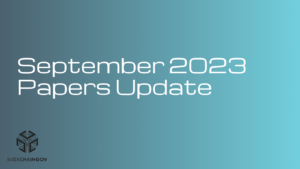 Articles, Books, News, PublicationsSeptember 2023 Papers UpdateSeptember 2023 Papers Update
Our team has been keeping busy with a variety of research projects, focus groups, and initiatives, analyzing from different perspectives the evolution of the blockchain space!
It’s been a while since we last updated our website with these exciting developments, so we wanted to share some of the latest happenings with you. Here you can find the list of our most recent papers and book chapters.
Papers
Von Blomberg, M., Reijers, W. (2023) “Who Deserves Credit? Banks for the Virtuous in Rural China” in Journal of Contemporary China. Taylor & Francis.
Bühler, M.M.; Calzada, I.; Cane, I.; Jelinek, T.; Kapoor, A.; Mannan, M.; Mehta, S.; Mookerje, V.; Nübel, K.; Pentland, A.; Scholz, T.; Siddharth, D.; Tait, J.; Vaitla, B.; Zhu, J. (2023) “Unlocking the Power of Digital Commons: Data Cooperatives as a Pathway for Data Sovereign, Innovative and Equitable Digital Communities”. Digital 2023, 3, 146–171. https://doi.org/10.3390/digital3030011
Merk, T., Tan, J., Hubbard, S., Oak, E. (2023) “Open Problems in DAOs”, website publication (and under process for submission)
De Filippi, P., Santolini, M. (2023) “Extitutional Theory: Modeling Structured Social Dynamics Beyond Institutions” in Ephemera: Theory in Politics and Organisation
Mannan, M., Pek, S. & Scholz, T. (2023) “Platform Cooperatives and Poverty Eradication: Building on the Legacy of Johnston Birchall”, in Journal of Entrepreneurial & Organizational Diversity (accepted, forthcoming)
Mannan, M. & Pek, S. (2023) “Platform Cooperatives and the Dilemmas of Labor-Member Participation”, in New Technology, Work and Employment. https://doi.org/10.1111/ntwe.12273.
De Filippi, P., Enguehard, C., Fayon, D., Gagnebien, A., Vidal, G. (2023) “Quelques enjeux de sécurité, juridiques, économiques, et énergétiques des blockchains” in Terminal. https://doi.org/10.4000/terminal.8995
Special Issues
De Filippi, P., Enguehard C., Fayon D., Gagnebien A., Vidal G. (eds) (2023) special edition on “Blockchains : enjeux de sécurité, juridiques, économiques, et coûts énergétiques” for Terminal.
[...]
Articles, Books, News, PublicationsSeptember 2023 Papers UpdateSeptember 2023 Papers Update
Our team has been keeping busy with a variety of research projects, focus groups, and initiatives, analyzing from different perspectives the evolution of the blockchain space!
It’s been a while since we last updated our website with these exciting developments, so we wanted to share some of the latest happenings with you. Here you can find the list of our most recent papers and book chapters.
Papers
Von Blomberg, M., Reijers, W. (2023) “Who Deserves Credit? Banks for the Virtuous in Rural China” in Journal of Contemporary China. Taylor & Francis.
Bühler, M.M.; Calzada, I.; Cane, I.; Jelinek, T.; Kapoor, A.; Mannan, M.; Mehta, S.; Mookerje, V.; Nübel, K.; Pentland, A.; Scholz, T.; Siddharth, D.; Tait, J.; Vaitla, B.; Zhu, J. (2023) “Unlocking the Power of Digital Commons: Data Cooperatives as a Pathway for Data Sovereign, Innovative and Equitable Digital Communities”. Digital 2023, 3, 146–171. https://doi.org/10.3390/digital3030011
Merk, T., Tan, J., Hubbard, S., Oak, E. (2023) “Open Problems in DAOs”, website publication (and under process for submission)
De Filippi, P., Santolini, M. (2023) “Extitutional Theory: Modeling Structured Social Dynamics Beyond Institutions” in Ephemera: Theory in Politics and Organisation
Mannan, M., Pek, S. & Scholz, T. (2023) “Platform Cooperatives and Poverty Eradication: Building on the Legacy of Johnston Birchall”, in Journal of Entrepreneurial & Organizational Diversity (accepted, forthcoming)
Mannan, M. & Pek, S. (2023) “Platform Cooperatives and the Dilemmas of Labor-Member Participation”, in New Technology, Work and Employment. https://doi.org/10.1111/ntwe.12273.
De Filippi, P., Enguehard, C., Fayon, D., Gagnebien, A., Vidal, G. (2023) “Quelques enjeux de sécurité, juridiques, économiques, et énergétiques des blockchains” in Terminal. https://doi.org/10.4000/terminal.8995
Special Issues
De Filippi, P., Enguehard C., Fayon D., Gagnebien A., Vidal G. (eds) (2023) special edition on “Blockchains : enjeux de sécurité, juridiques, économiques, et coûts énergétiques” for Terminal.
[...]
 Events, News, PressThe first issue of the Blockchaingov Newsletter is out!We are excited to announce that the 1 st issue of the newsletter is out!Check this out if you’re interested in our recent research in the field of blockchain! Newly published papers, events, conferences and so much more!
We believe in the power of #community and that knowledge should be shared and multiplied. This newsletter aims to provide updates on the projects, conferences, and events that our team members take part in. We are excited to share this first newsletter issue that we plan to publish each month. We are open to collaborations, and feedback and we are also hiring!
Hope you like the material we prepared for you! Click here to read the first issue of the Blockchaingov news!
You can click on the button bellow to subscribe to the newsletter!
Subscribe to BlockchainGov News!
Facebook
Twitter
LinkedIn [...]
Events, News, PressThe first issue of the Blockchaingov Newsletter is out!We are excited to announce that the 1 st issue of the newsletter is out!Check this out if you’re interested in our recent research in the field of blockchain! Newly published papers, events, conferences and so much more!
We believe in the power of #community and that knowledge should be shared and multiplied. This newsletter aims to provide updates on the projects, conferences, and events that our team members take part in. We are excited to share this first newsletter issue that we plan to publish each month. We are open to collaborations, and feedback and we are also hiring!
Hope you like the material we prepared for you! Click here to read the first issue of the Blockchaingov news!
You can click on the button bellow to subscribe to the newsletter!
Subscribe to BlockchainGov News!
Facebook
Twitter
LinkedIn [...]
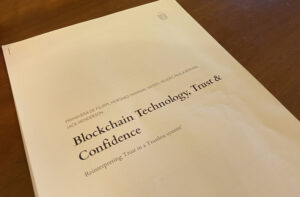 Articles, Books, News, Publications, ReportsNew Academic Papers Alert!New
Academic Papers
Alert !
De Filippi, P, Mannan, M. presentation of “The BlockchainGov Report on Trust and Confidence in Blockchain Technology”, in the framework of the EUI Tech Cluster research seminar series. European University Institute. 18 May 2022. Florence. Italy
Our team is involved in a variety of research projects, focus groups and initiatives that aim to explore challenges of the blockchain technology.
Here are some of the recently published selected papers authored by our members, advisors and affiliates:
1. De Filippi, P., Poux, P., Deffains, B. (2022) “MEV ou la tragédie des blockchains en tant que communs, in Terminal. (forthcoming)
2. Rennie, E., Zargham, M., Tan, J., Miller, L., Abbott, J., Nabben, K., De Filippi, P. (2022) “Towards a participatory digital ethnography of blockchain governance.”
3. Reijers, W., Orgad, L., De Filippi, P. (2022) “The Rise of Cybernetic Citizenship” in Citizenship Studies, Special Issue on “Digital Citizenship in the Post-Pandemic Urban Realm.
4. De Filippi, P., Mannan, M., Reijers, W. (2022) “The Alegality of Blockchain Technology”, in Policy & Society, special issue: “The Policy Dilemmas of Blockchain”.
5. De Filippi, P., Leiter, A. (2021) “Blockchain in Outer Space” in American Journal of International Law (AJIL) Unbound, special issue: “The Global Governance Implications of Blockchain”
[...]
Articles, Books, News, Publications, ReportsNew Academic Papers Alert!New
Academic Papers
Alert !
De Filippi, P, Mannan, M. presentation of “The BlockchainGov Report on Trust and Confidence in Blockchain Technology”, in the framework of the EUI Tech Cluster research seminar series. European University Institute. 18 May 2022. Florence. Italy
Our team is involved in a variety of research projects, focus groups and initiatives that aim to explore challenges of the blockchain technology.
Here are some of the recently published selected papers authored by our members, advisors and affiliates:
1. De Filippi, P., Poux, P., Deffains, B. (2022) “MEV ou la tragédie des blockchains en tant que communs, in Terminal. (forthcoming)
2. Rennie, E., Zargham, M., Tan, J., Miller, L., Abbott, J., Nabben, K., De Filippi, P. (2022) “Towards a participatory digital ethnography of blockchain governance.”
3. Reijers, W., Orgad, L., De Filippi, P. (2022) “The Rise of Cybernetic Citizenship” in Citizenship Studies, Special Issue on “Digital Citizenship in the Post-Pandemic Urban Realm.
4. De Filippi, P., Mannan, M., Reijers, W. (2022) “The Alegality of Blockchain Technology”, in Policy & Society, special issue: “The Policy Dilemmas of Blockchain”.
5. De Filippi, P., Leiter, A. (2021) “Blockchain in Outer Space” in American Journal of International Law (AJIL) Unbound, special issue: “The Global Governance Implications of Blockchain”
[...]
 Blog posts, Publications1st Meeting of ERC BlockchainGov Project1st Meeting of ERC BlockchainGov Project
After introductions, the agenda included sessions on Legitimacy, Outreach & Policy, OpEds, a potential documentary, PhD Consultancy, and multiple sessions on theory concerning the following topics:
Blockchain, Coercion & Legitimacy: Dyzenhaus, David. 1997. “Legality and Legitimacy: Refractions from Weimar”
Decentralized/Polycentric governance: Aligica, Paul D., and Vlad Tarko. 2012. “Polycentricity: From Polanyi to Ostrom, and Beyond.”
Blockchain and Commons-based governance: Grisel, Florian. 2021. “How Migrations Affect Private Orders: Norms and Practices in the Fishery of Marseille“
Constitutional guarantees in blockchain tech: Suzor, Nicolas. 2018. “Digital Constitutionalism: Using the Rule of Law to Evaluate the Legitimacy of Governance by Platforms.”
Stay tuned to learn more about our new scholars!
From left to right: Primavera De Filippi, Morshed Mannan, Tara Merk, Philemon Poux, Vashti Maharaj (virtual), Sofia Cossar (virtual), Jamilya Kamalova (virtual), Nathan Vandy, Yann Aouidef, Simona Ramos, Wessel Reijers. [...]
Blog posts, Publications1st Meeting of ERC BlockchainGov Project1st Meeting of ERC BlockchainGov Project
After introductions, the agenda included sessions on Legitimacy, Outreach & Policy, OpEds, a potential documentary, PhD Consultancy, and multiple sessions on theory concerning the following topics:
Blockchain, Coercion & Legitimacy: Dyzenhaus, David. 1997. “Legality and Legitimacy: Refractions from Weimar”
Decentralized/Polycentric governance: Aligica, Paul D., and Vlad Tarko. 2012. “Polycentricity: From Polanyi to Ostrom, and Beyond.”
Blockchain and Commons-based governance: Grisel, Florian. 2021. “How Migrations Affect Private Orders: Norms and Practices in the Fishery of Marseille“
Constitutional guarantees in blockchain tech: Suzor, Nicolas. 2018. “Digital Constitutionalism: Using the Rule of Law to Evaluate the Legitimacy of Governance by Platforms.”
Stay tuned to learn more about our new scholars!
From left to right: Primavera De Filippi, Morshed Mannan, Tara Merk, Philemon Poux, Vashti Maharaj (virtual), Sofia Cossar (virtual), Jamilya Kamalova (virtual), Nathan Vandy, Yann Aouidef, Simona Ramos, Wessel Reijers. [...]
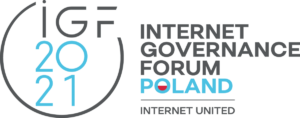 Conference Presentations, EventsHow to Govern Decentralized Digital Public Goods? Blockchains Between Innovation and RegulationHow to Govern Decentralized Digital Public Goods? Blockchains Between Innovation and Regulation
De Filippi, P. “How to govern decentralized digital public goods? Blockchains between innovation and regulation” panel presentation at the Internet Governance Forum (IGF) 2021, organised by the United Nations. 6 December 2021 (online). [...]
Conference Presentations, EventsHow to Govern Decentralized Digital Public Goods? Blockchains Between Innovation and RegulationHow to Govern Decentralized Digital Public Goods? Blockchains Between Innovation and Regulation
De Filippi, P. “How to govern decentralized digital public goods? Blockchains between innovation and regulation” panel presentation at the Internet Governance Forum (IGF) 2021, organised by the United Nations. 6 December 2021 (online). [...]
 Conference Organizations, EventsEuropean Crypto-Initiative (EUCI) WorkshopCo-organiser of the first European Crypto-Initiative (EUCI) Workshop, organised in collaboration with COALA and the BlockchainGov project of the European Research Council (ERC). December 2-3, Citizen Corner Brussels, Belgium. [...]
Conference Organizations, EventsEuropean Crypto-Initiative (EUCI) WorkshopCo-organiser of the first European Crypto-Initiative (EUCI) Workshop, organised in collaboration with COALA and the BlockchainGov project of the European Research Council (ERC). December 2-3, Citizen Corner Brussels, Belgium. [...]
 Conference Organizations, Events1st Meeting of ERC BlockchainGov ProjectOrganiser of the 1st Meeting of European Research Council BlockchainGov Project, December 4-5, 2021, CERSA – Paris, France [...]
Conference Organizations, Events1st Meeting of ERC BlockchainGov ProjectOrganiser of the 1st Meeting of European Research Council BlockchainGov Project, December 4-5, 2021, CERSA – Paris, France [...]
 Conference Organizations, EventsCryptogovernance WorkshopCo-organiser of the Cryptogovernance Workshop, organized by Wharton’s Blockchain & Digital Asset Project at University of Pennsylvania. 30 November 2021 (online) [...]
Conference Organizations, EventsCryptogovernance WorkshopCo-organiser of the Cryptogovernance Workshop, organized by Wharton’s Blockchain & Digital Asset Project at University of Pennsylvania. 30 November 2021 (online) [...]
 Misc, TeachingSmart Contracts & Legal ContractsDe Filippi, P., Guest Lecture: “Smart Contracts & Legal Contracts” at Fordham Law School (1 hour) as part of the “Securities” course, run by Donna Redel. [...]
Misc, TeachingSmart Contracts & Legal ContractsDe Filippi, P., Guest Lecture: “Smart Contracts & Legal Contracts” at Fordham Law School (1 hour) as part of the “Securities” course, run by Donna Redel. [...]
 Misc, TeachingThe Economic Impact of BlockchainDe Filippi, P., Module 3: Deep Dive Blockchain – Unit 0: The Economic Impact of Blockchain at DT2 Invest Massive Open Online Course (MOOC). Online course sponsored by the European Commission, developed by France Digitale. [...]
Misc, TeachingThe Economic Impact of BlockchainDe Filippi, P., Module 3: Deep Dive Blockchain – Unit 0: The Economic Impact of Blockchain at DT2 Invest Massive Open Online Course (MOOC). Online course sponsored by the European Commission, developed by France Digitale. [...]
 Misc, TeachingRole of Platform Cooperatives at the Base of the PyramidMannan, M., Guest Lecture: “Role of Platform Cooperatives at the Base of the Pyramid” for the Online Course “Platform Cooperatives Now!” at The New School, New York City & Mondragon University, Spain (1 hour) [...]
Misc, TeachingRole of Platform Cooperatives at the Base of the PyramidMannan, M., Guest Lecture: “Role of Platform Cooperatives at the Base of the Pyramid” for the Online Course “Platform Cooperatives Now!” at The New School, New York City & Mondragon University, Spain (1 hour) [...]
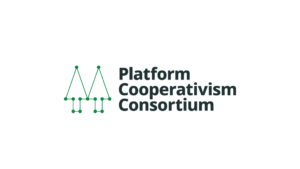 Events, Focus GroupsPlatform Cooperative Working GroupDe Filippi, P., Mannan, M., “Platform Cooperative Working Group” at the Berkman Klein Center for Internet and Society at Harvard University [...]
Events, Focus GroupsPlatform Cooperative Working GroupDe Filippi, P., Mannan, M., “Platform Cooperative Working Group” at the Berkman Klein Center for Internet and Society at Harvard University [...]
 Events, Focus GroupsTechnological Change & SocietyDe Filippi, P., Mannan, M., Research cluster on “Technological Change & Society” (EUI) [...]
Events, Focus GroupsTechnological Change & SocietyDe Filippi, P., Mannan, M., Research cluster on “Technological Change & Society” (EUI) [...]
 Events, Focus GroupsAlternative Data Futures: Cooperative Principles, Data Trusts, and the Digital EconomyDe Filippi, P., Mannan, M., Research sprint on “Alternative Data Futures: Cooperative Principles, Data Trusts, and the Digital Economy” at the Berkman Klein Center for Internet and Society (October-December 2021)
During the fall of 2021, The New School’s Platform Cooperativism Consortium and BKC ran a Research Sprint with a cohort of early-career researchers, cooperative leaders, and activists from 8 countries across 4 continents. The “Alternative Data Futures: Cooperative Principles, Data Trusts, and the Digital Economy” Research Sprint brought together this group to explore new pathways for democratic governance of collective data.Archives and Recap Here. [...]
Events, Focus GroupsAlternative Data Futures: Cooperative Principles, Data Trusts, and the Digital EconomyDe Filippi, P., Mannan, M., Research sprint on “Alternative Data Futures: Cooperative Principles, Data Trusts, and the Digital Economy” at the Berkman Klein Center for Internet and Society (October-December 2021)
During the fall of 2021, The New School’s Platform Cooperativism Consortium and BKC ran a Research Sprint with a cohort of early-career researchers, cooperative leaders, and activists from 8 countries across 4 continents. The “Alternative Data Futures: Cooperative Principles, Data Trusts, and the Digital Economy” Research Sprint brought together this group to explore new pathways for democratic governance of collective data.Archives and Recap Here. [...]
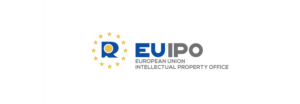 Conference Presentations, EventsBlockchain & the LawDe Filippi, P. “Blockchain & the Law”, presentation at the EUIPO Observatory “Impact of Technology” expert group workshop. 18 November 2021 (online) [...]
Conference Presentations, EventsBlockchain & the LawDe Filippi, P. “Blockchain & the Law”, presentation at the EUIPO Observatory “Impact of Technology” expert group workshop. 18 November 2021 (online) [...]
 Conference Presentations, EventsDistributed Autonomous Organizations and CooperativesDe Filippi, P. “Distributed Autonomous Organizations and Cooperatives” presentation at the conference #TheNewCommonSense: Forging the Cooperative Digital Economy, organised by the Platform Cooperativism consortium. 17 November 2021 (online).
Video archives and Recap on the official website page! [...]
Conference Presentations, EventsDistributed Autonomous Organizations and CooperativesDe Filippi, P. “Distributed Autonomous Organizations and Cooperatives” presentation at the conference #TheNewCommonSense: Forging the Cooperative Digital Economy, organised by the Platform Cooperativism consortium. 17 November 2021 (online).
Video archives and Recap on the official website page! [...]
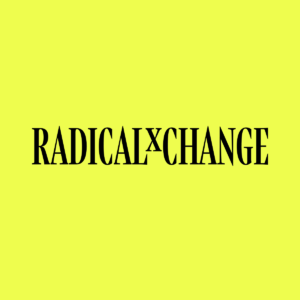 Conference Presentations, EventsPersonhood, Blockchain & LegitimacyDe Filippi, P. “Personhood, Blockchain & Legitimacy” panel presentation for the RadicalXchange TV series. 16 November 2021 (online) [...]
Conference Presentations, EventsPersonhood, Blockchain & LegitimacyDe Filippi, P. “Personhood, Blockchain & Legitimacy” panel presentation for the RadicalXchange TV series. 16 November 2021 (online) [...]
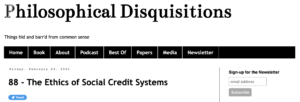 Interviews, MiscThe Ethics of Social Credit SystemsPodcast appearance on Philosophical Disquisitions – The Ethics of Social Credit Systems (26/02/2021) [...]
Interviews, MiscThe Ethics of Social Credit SystemsPodcast appearance on Philosophical Disquisitions – The Ethics of Social Credit Systems (26/02/2021) [...]
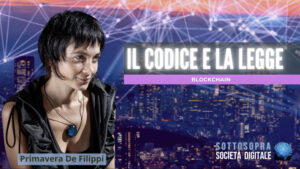 Interviews, MiscBlockchain et Organizzazioni decentralizzatePodcast appearance on Idee SottoSopra — Blockchain et Organizzazioni decentralizzate (18/04/2021) [...]
Interviews, MiscBlockchain et Organizzazioni decentralizzatePodcast appearance on Idee SottoSopra — Blockchain et Organizzazioni decentralizzate (18/04/2021) [...]
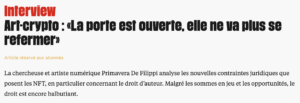 Interviews, MiscArt Crytpo : la porte est ouverte, elle ne va pas se refermerInterview for an article on “Art Crytpo : la porte est ouverte, elle ne va pas se refermer” in the online media Libération (22/03/2021) [...]
Interviews, MiscArt Crytpo : la porte est ouverte, elle ne va pas se refermerInterview for an article on “Art Crytpo : la porte est ouverte, elle ne va pas se refermer” in the online media Libération (22/03/2021) [...]
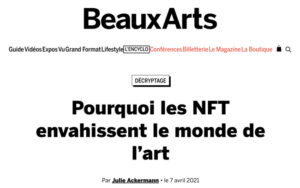 Interviews, MiscPourquoi les NFT envahissent le monde de l’artInterview for an article on “Pourquoi les NFT envahissent le monde de l’art” in Beaux Arts Magazine (19/04/2021) [...]
Interviews, MiscPourquoi les NFT envahissent le monde de l’artInterview for an article on “Pourquoi les NFT envahissent le monde de l’art” in Beaux Arts Magazine (19/04/2021) [...]
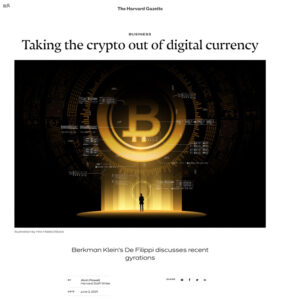 Interviews, MiscTaking the crypto out of digital currencyInterview for Harvard Gazette on “Taking the crypto out of digital currency” (25/05/2021) [...]
Interviews, MiscTaking the crypto out of digital currencyInterview for Harvard Gazette on “Taking the crypto out of digital currency” (25/05/2021) [...]
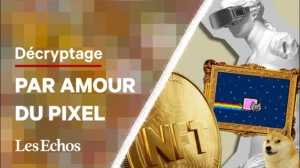 Interviews, MiscComment les NFTs révolutionnent le monde de l’artInterview for an online video on “Comment les NFTs révolutionnent le monde de l’art” for the “Decryptage” series in Les Echos (10/06/2021) [...]
Interviews, MiscComment les NFTs révolutionnent le monde de l’artInterview for an online video on “Comment les NFTs révolutionnent le monde de l’art” for the “Decryptage” series in Les Echos (10/06/2021) [...]
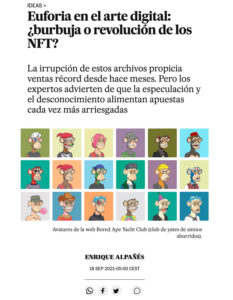 Interviews, MiscEuforia en el arte digital: ¿burbuja o revolución de los NFT?Interview for an article on “Euforia en el arte digital: ¿burbuja o revolución de los NFT?” in El Pais (18/09/2021) [...]
Interviews, MiscEuforia en el arte digital: ¿burbuja o revolución de los NFT?Interview for an article on “Euforia en el arte digital: ¿burbuja o revolución de los NFT?” in El Pais (18/09/2021) [...]
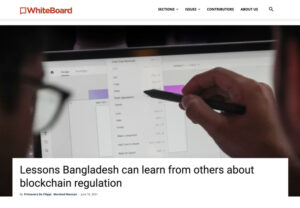 Misc, News, PressLessons Bangladesh can learn from others about blockchain regulationLessons Bangladesh can learn from others about blockchain regulation
De Filippi, P., Mannan, M. (2021) “Lessons Bangladesh can learn from others about blockchain regulation” in Whiteboard Magazine. 16 June 2021.
Read the Article [...]
Misc, News, PressLessons Bangladesh can learn from others about blockchain regulationLessons Bangladesh can learn from others about blockchain regulation
De Filippi, P., Mannan, M. (2021) “Lessons Bangladesh can learn from others about blockchain regulation” in Whiteboard Magazine. 16 June 2021.
Read the Article [...]
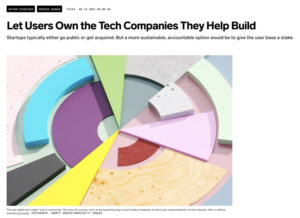 Misc, News, PressLet Users Own the Tech Companies They Help BuildLet Users Own the Tech Companies They Help Build
Schneider, N., Mannan, M. (2021) “Let Users Own the Tech Companies They Help Build”, in WIRED Magazine. 19 June 2021.
The law might even make “exit to community” the price of success, such as by expecting large social media companies to have user representatives on their boards, with or without transferring equity.PHOTOGRAPH: ANDRIY ONUFRIYENKO/GETTY IMAGES
Read the Article [...]
Misc, News, PressLet Users Own the Tech Companies They Help BuildLet Users Own the Tech Companies They Help Build
Schneider, N., Mannan, M. (2021) “Let Users Own the Tech Companies They Help Build”, in WIRED Magazine. 19 June 2021.
The law might even make “exit to community” the price of success, such as by expecting large social media companies to have user representatives on their boards, with or without transferring equity.PHOTOGRAPH: ANDRIY ONUFRIYENKO/GETTY IMAGES
Read the Article [...]
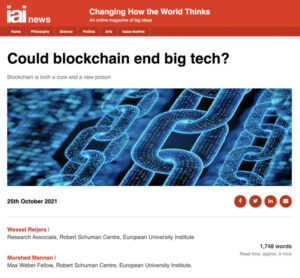 Misc, News, PressCould Blockchain end Big Tech?Could Blockchain end Big Tech?
Reijers, W., Mannan, M. (2021) “Could Blockchain end Big Tech?”, in IAI.TV. 25 October 2021.
Read the Article
Blockchain is both a cure and a new poison [...]
Misc, News, PressCould Blockchain end Big Tech?Could Blockchain end Big Tech?
Reijers, W., Mannan, M. (2021) “Could Blockchain end Big Tech?”, in IAI.TV. 25 October 2021.
Read the Article
Blockchain is both a cure and a new poison [...]
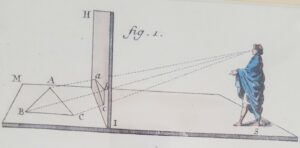 Blog posts, PublicationsIntroduction to Extitutional TheorySchingler, J. K., De Filippi, P. (2021) “Introduction to Extitutional Theory”. Berkman-Klein Center for Internet & Society at Harvard University.
“Extitutional theory is an emerging field of scholarship that provides a set of conceptual tools to describe and analyse the underlying social dynamics of a variety of social arrangements, such as communities, companies, organisations, or any other types of institutions.
Extitutional theory posits that the institutional framework is just one specific lens through which we can make sense of social behaviour. Social dynamics that are not part of an institution are not unstructured, just differently structured. Specifically, institutions focus on the static and inert elements of social structures — the aspects that persist over time — whereas extitutions focus on the dynamic and mutating elements of social structures — the aspects that continuously evolve over time. Both serve as filters to observe different aspects of the underlying social arrangements. This means that if we look at structured social dynamics only and exclusively through an institutional lens, we are only seeing one part of the larger picture. Extitutional theory provides an alternative lens — and the choice to use it is a normative decision to look at another part of the picture.”
Read the following of the blogpost here. [...]
Blog posts, PublicationsIntroduction to Extitutional TheorySchingler, J. K., De Filippi, P. (2021) “Introduction to Extitutional Theory”. Berkman-Klein Center for Internet & Society at Harvard University.
“Extitutional theory is an emerging field of scholarship that provides a set of conceptual tools to describe and analyse the underlying social dynamics of a variety of social arrangements, such as communities, companies, organisations, or any other types of institutions.
Extitutional theory posits that the institutional framework is just one specific lens through which we can make sense of social behaviour. Social dynamics that are not part of an institution are not unstructured, just differently structured. Specifically, institutions focus on the static and inert elements of social structures — the aspects that persist over time — whereas extitutions focus on the dynamic and mutating elements of social structures — the aspects that continuously evolve over time. Both serve as filters to observe different aspects of the underlying social arrangements. This means that if we look at structured social dynamics only and exclusively through an institutional lens, we are only seeing one part of the larger picture. Extitutional theory provides an alternative lens — and the choice to use it is a normative decision to look at another part of the picture.”
Read the following of the blogpost here. [...]
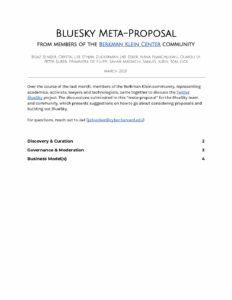 Publications, ReportsA meta-proposal for Twitter’s bluesky projectEsber, J., Sender, B., Zuckerman, E., Lee, C., Nwachukwu, N., Ly, O., Suber, P., De Filippi, P., Massachi, S., Klein, S., Zick, T. (2021). A meta-proposal for Twitter’s bluesky project (March 31, 2021). [...]
Publications, ReportsA meta-proposal for Twitter’s bluesky projectEsber, J., Sender, B., Zuckerman, E., Lee, C., Nwachukwu, N., Ly, O., Suber, P., De Filippi, P., Massachi, S., Klein, S., Zick, T. (2021). A meta-proposal for Twitter’s bluesky project (March 31, 2021). [...]
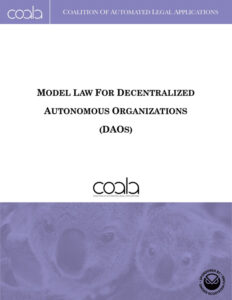 Publications, ReportsModel Law for DAOsThere are ongoing debates surrounding the legal status of DAOs, their participants and procedures. For example, how can an organization that is inherently transnational in nature, benefit from affordances such as legal personality and limited liability without incorporation in a single jurisdiction? Or conversely, how can legal requirements like “registration” & “reporting” be translated to an organization made of bits? This legal insecurity has significantly hampered the development and broader adoption of this new form of social organization.
The DAO Model Law is a multistakeholder effort led by COALA (Coalition of Legal Automated Applications) to provide legal certainty for DAOs and their participants, and unlike other regulatory frameworks, accommodate flexibility for their unique features and further innovation. The Model Law seeks to strike a balance between the importance of innovation and experimental freedom in technological development, and the importance of legal protections and a sound regulatory framework in encouraging broader societal engagement with this new organizational structure.
Who is the DAO Model Law aimed for?
For policy-makers who wish to support the formation and management of DAOs, the DAO Model Law provides a harmonized model for legislation that still harnesses the unique properties of DAOs that make them alegal, or not currently seen by the legal system, in the first place. For instance, rather than seeking to draw DAOs within a territorial legal order, the Model Law emphasizes recognition by states, rather than registration in states, to accommodate the transnational nature of DAOs. It also combines extensive party autonomy for DAO members and separate legal personality for the DAO in order to facilitate, rather than hinder, pseudonymous participation and recognize that human-to-machine or machine-to-machine interactions can carry out valid legal acts.
For participants in DAOs, the Model Law provides the benefits of legal personality, legal capacity and limited liability. Although no governmental authority could directly enforce the Model Law provisions onto a DAO, these benefits offer ample incentive to comply with the Model Law. The recognition of legal personhood for DAOs entails many rights and protections—such as the right to own assets, enter into contractual relationships, sue or be sued, and potentially benefit from a limited liability regime. Some will forgo legal recognition, preferring instead autonomy in their operation and governance. DAOs that seek legal personality and limited liability of its members might need to implement specific features and technological guarantees that accommodate important policy objectives, such as publicity about the formation and governance of business organizations.
How does the DAO Model law work?
The Model Law task force studied the provisions of corporate law, aiming for a light-touch approach to regulation based on the principles of functional and regulatory equivalence.
Functional equivalences work as a pathway to establish the equivalence of an object that is already contemplated by legal rule and another that is not. Such equivalences broaden the means by which a regulated activity can be considered legally compliant. A well-known precedent is the UNCITRAL Model Law for Electronic Commerce, which establishes functional equivalence between a paper-based document and an electronic document. For the regulation of DAOs, the Model Law aims to establish functional equivalence between the transfer of corporate shares on the official company share registers and the use of blockchain-based infrastructure to achieve the same function.
Regulatory equivalences work with a similar logic, identifying the policy objective behind any given regulation and how this same goal can be achieved through different means, in this case through the affordances of blockchain technology. To establish regulatory equivalence the Model Law holds that the publication of certain information on a publicly-accessible blockchain meets the publicity objective of corporate registration.
Using these conceptual frameworks, the Model Law addresses the following points:
Identification of legal corporate rules that can be fulfilled through technological guarantees in the blockchain space (e.g. smart-contract-based separation of funds, blockchain-enforced “corporate veil”, real-time audits and reporting, agency problem, etc. )
Discussions on the specificities of blockchain-based organisations that must be accounted for from a legal perspective(e.g. forking, protocol changes, etc.) and elaboration of techno-legal solutions to address these specificities.
Identification of legal corporate rules that do not have a technical equivalent solution (e.g., KYC identification of all participants) and elaboration of techno-legal alternatives that better account for the technical guarantees of blockchain technology.
Establishing the legal foundations of ‘regulatory equivalence’ — collecting previous examples of “functional equivalence” (e.g. the UNCITRAL electronic contracts) and “regulatory equivalence” (e.g. EU ‘principle-based’ regulatory approaches).
The DAO Model Law draws on lessons from model laws for flexible business organizations (e.g., OAS Model Law for the Simplified Stock Corporation) to pursue specific objectives like the uniform treatment of DAOs across States—particularly with respect to recognizing the legal personality and/or limited liability of its members. It also considers a series of new scenarios that are not encountered during the ordinary operations of more traditional organisations, by setting out procedures for hard forking decisions and remedying technical bugs or exploits that would otherwise render the DAO unoperational. It stipulates a series of governance rules for handling exceptional events such as TheDAO attack and other contentious forks, thereby mitigating both public policy concerns regarding unaccountability and participant concerns about potential joint and several liability.
What’s next?
The task force has already identified ways to extend the Model Law moving forward. Through a series of case studies looking at current DAO governance models and their stakeholders, the Model Law might address common problems in corporate governance, such as agency problems and conflicts of interest among multiple stakeholders, by examining how blockchain addresses these issues that would otherwise be addressed by legal means. The Model Law might also identify functional equivalence between existing corporate governance requirements and the governance procedures of DAOs and their internal controls for decision-making, participation and funds management.
In the coming months the task force hopes to engage a broad audience of people and diverse stakeholders in order to raise awareness on the topics addressed, foster discussions and collaborate on the model’s continuous evolution. With this first iteration, the goal was to convene legal scholars in blockchain to bridge the gap between a variety of existing and potential activities of DAOs and the various regulatory frameworks currently or yet to be implemented in different jurisdictions. But this is only the beginning of a much longer journey: the DAO Model Law will depend on ongoing exchanges between lawyers, technologists and eventually policy makers to thoughtfully address the fast-moving landscape of blockchain-based systems and achieve broad and participatory adoption.
Read the DAO Model Law in full here. Please do not hesitate to reach out to us at info@coala.global if you would like to learn more or contribute to the DAO Model Law project.
Choi, C., De Filippi, P., Dudley, R., Elrifai, S., Fannizadeh, F., Guillaume, F., Leiter, A., Mannan, M., McMullen, G., Riva, S., Shimony O. (2021) [...]
Publications, ReportsModel Law for DAOsThere are ongoing debates surrounding the legal status of DAOs, their participants and procedures. For example, how can an organization that is inherently transnational in nature, benefit from affordances such as legal personality and limited liability without incorporation in a single jurisdiction? Or conversely, how can legal requirements like “registration” & “reporting” be translated to an organization made of bits? This legal insecurity has significantly hampered the development and broader adoption of this new form of social organization.
The DAO Model Law is a multistakeholder effort led by COALA (Coalition of Legal Automated Applications) to provide legal certainty for DAOs and their participants, and unlike other regulatory frameworks, accommodate flexibility for their unique features and further innovation. The Model Law seeks to strike a balance between the importance of innovation and experimental freedom in technological development, and the importance of legal protections and a sound regulatory framework in encouraging broader societal engagement with this new organizational structure.
Who is the DAO Model Law aimed for?
For policy-makers who wish to support the formation and management of DAOs, the DAO Model Law provides a harmonized model for legislation that still harnesses the unique properties of DAOs that make them alegal, or not currently seen by the legal system, in the first place. For instance, rather than seeking to draw DAOs within a territorial legal order, the Model Law emphasizes recognition by states, rather than registration in states, to accommodate the transnational nature of DAOs. It also combines extensive party autonomy for DAO members and separate legal personality for the DAO in order to facilitate, rather than hinder, pseudonymous participation and recognize that human-to-machine or machine-to-machine interactions can carry out valid legal acts.
For participants in DAOs, the Model Law provides the benefits of legal personality, legal capacity and limited liability. Although no governmental authority could directly enforce the Model Law provisions onto a DAO, these benefits offer ample incentive to comply with the Model Law. The recognition of legal personhood for DAOs entails many rights and protections—such as the right to own assets, enter into contractual relationships, sue or be sued, and potentially benefit from a limited liability regime. Some will forgo legal recognition, preferring instead autonomy in their operation and governance. DAOs that seek legal personality and limited liability of its members might need to implement specific features and technological guarantees that accommodate important policy objectives, such as publicity about the formation and governance of business organizations.
How does the DAO Model law work?
The Model Law task force studied the provisions of corporate law, aiming for a light-touch approach to regulation based on the principles of functional and regulatory equivalence.
Functional equivalences work as a pathway to establish the equivalence of an object that is already contemplated by legal rule and another that is not. Such equivalences broaden the means by which a regulated activity can be considered legally compliant. A well-known precedent is the UNCITRAL Model Law for Electronic Commerce, which establishes functional equivalence between a paper-based document and an electronic document. For the regulation of DAOs, the Model Law aims to establish functional equivalence between the transfer of corporate shares on the official company share registers and the use of blockchain-based infrastructure to achieve the same function.
Regulatory equivalences work with a similar logic, identifying the policy objective behind any given regulation and how this same goal can be achieved through different means, in this case through the affordances of blockchain technology. To establish regulatory equivalence the Model Law holds that the publication of certain information on a publicly-accessible blockchain meets the publicity objective of corporate registration.
Using these conceptual frameworks, the Model Law addresses the following points:
Identification of legal corporate rules that can be fulfilled through technological guarantees in the blockchain space (e.g. smart-contract-based separation of funds, blockchain-enforced “corporate veil”, real-time audits and reporting, agency problem, etc. )
Discussions on the specificities of blockchain-based organisations that must be accounted for from a legal perspective(e.g. forking, protocol changes, etc.) and elaboration of techno-legal solutions to address these specificities.
Identification of legal corporate rules that do not have a technical equivalent solution (e.g., KYC identification of all participants) and elaboration of techno-legal alternatives that better account for the technical guarantees of blockchain technology.
Establishing the legal foundations of ‘regulatory equivalence’ — collecting previous examples of “functional equivalence” (e.g. the UNCITRAL electronic contracts) and “regulatory equivalence” (e.g. EU ‘principle-based’ regulatory approaches).
The DAO Model Law draws on lessons from model laws for flexible business organizations (e.g., OAS Model Law for the Simplified Stock Corporation) to pursue specific objectives like the uniform treatment of DAOs across States—particularly with respect to recognizing the legal personality and/or limited liability of its members. It also considers a series of new scenarios that are not encountered during the ordinary operations of more traditional organisations, by setting out procedures for hard forking decisions and remedying technical bugs or exploits that would otherwise render the DAO unoperational. It stipulates a series of governance rules for handling exceptional events such as TheDAO attack and other contentious forks, thereby mitigating both public policy concerns regarding unaccountability and participant concerns about potential joint and several liability.
What’s next?
The task force has already identified ways to extend the Model Law moving forward. Through a series of case studies looking at current DAO governance models and their stakeholders, the Model Law might address common problems in corporate governance, such as agency problems and conflicts of interest among multiple stakeholders, by examining how blockchain addresses these issues that would otherwise be addressed by legal means. The Model Law might also identify functional equivalence between existing corporate governance requirements and the governance procedures of DAOs and their internal controls for decision-making, participation and funds management.
In the coming months the task force hopes to engage a broad audience of people and diverse stakeholders in order to raise awareness on the topics addressed, foster discussions and collaborate on the model’s continuous evolution. With this first iteration, the goal was to convene legal scholars in blockchain to bridge the gap between a variety of existing and potential activities of DAOs and the various regulatory frameworks currently or yet to be implemented in different jurisdictions. But this is only the beginning of a much longer journey: the DAO Model Law will depend on ongoing exchanges between lawyers, technologists and eventually policy makers to thoughtfully address the fast-moving landscape of blockchain-based systems and achieve broad and participatory adoption.
Read the DAO Model Law in full here. Please do not hesitate to reach out to us at info@coala.global if you would like to learn more or contribute to the DAO Model Law project.
Choi, C., De Filippi, P., Dudley, R., Elrifai, S., Fannizadeh, F., Guillaume, F., Leiter, A., Mannan, M., McMullen, G., Riva, S., Shimony O. (2021) [...]
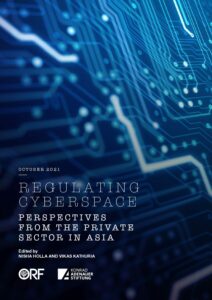 Publications, ReportsFinancial Inclusion through Fintech: Building Confidence and Encouraging Adoption of Emerging Technologies in BangladeshMannan, M. & Kamal, S. (2021)
In Holla, N. & Kathura, V. (eds.) Regulating Cyberspace: Perspectives from the Private Sector in Asia. ORF and Konrad-Adenauer Stiftung, New Delhi. [...]
Publications, ReportsFinancial Inclusion through Fintech: Building Confidence and Encouraging Adoption of Emerging Technologies in BangladeshMannan, M. & Kamal, S. (2021)
In Holla, N. & Kathura, V. (eds.) Regulating Cyberspace: Perspectives from the Private Sector in Asia. ORF and Konrad-Adenauer Stiftung, New Delhi. [...]
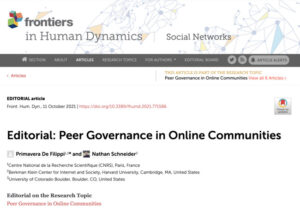 Books, PublicationsPeer Governance in Online CommunitiesDe Filippi, P., Schneider, N. (eds.) (2021) Peer Governance in Online Communities. Frontiers in Blockchain. [...]
Books, PublicationsPeer Governance in Online CommunitiesDe Filippi, P., Schneider, N. (eds.) (2021) Peer Governance in Online Communities. Frontiers in Blockchain. [...]
 Books, PublicationsGlossary of Distributed TechnologiesBodo, B., De Filippi, P., Scheuermann, B., Hassan, S., Fischer, A., Palmirani, M. (eds.) (2021) Glossary of Distributed Technologies. Internet Policy Review
The glossary is a project of the Blockchain and Society Policy Research Lab at University of Amsterdam, in collaboration with the P2P Models project at Complutense University, the Weizenbaum Institute in Berlin, and the The Future of Distributed Governance project at CNRS. It is supported financially thanks to European Research Council grants. [...]
Books, PublicationsGlossary of Distributed TechnologiesBodo, B., De Filippi, P., Scheuermann, B., Hassan, S., Fischer, A., Palmirani, M. (eds.) (2021) Glossary of Distributed Technologies. Internet Policy Review
The glossary is a project of the Blockchain and Society Policy Research Lab at University of Amsterdam, in collaboration with the P2P Models project at Complutense University, the Weizenbaum Institute in Berlin, and the The Future of Distributed Governance project at CNRS. It is supported financially thanks to European Research Council grants. [...]
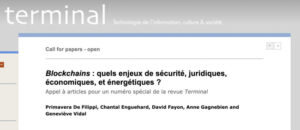 Books, PublicationsBlockchains: enjeux de sécurité, juridiques, économiques, et coûts énergétiquesDe Filippi, P., Enguehard C., Fayon D., Gagnebien A., Vidal G. (eds) (2021) special edition on “Blockchains : enjeux de sécurité, juridiques, économiques, et coûts énergétiques” for Terminal. [...]
Books, PublicationsBlockchains: enjeux de sécurité, juridiques, économiques, et coûts énergétiquesDe Filippi, P., Enguehard C., Fayon D., Gagnebien A., Vidal G. (eds) (2021) special edition on “Blockchains : enjeux de sécurité, juridiques, économiques, et coûts énergétiques” for Terminal. [...]
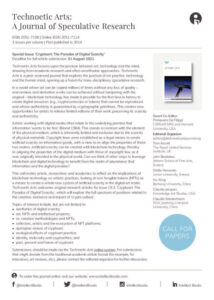 Books, PublicationsCryptoart: The Paradox of Digital ScarcityDe Filippi, P. (eds) (2021) Special Issue on “Cryptoart: The Paradox of Digital Scarcity” in Technoetic Arts: A journal of speculative research [...]
Books, PublicationsCryptoart: The Paradox of Digital ScarcityDe Filippi, P. (eds) (2021) Special Issue on “Cryptoart: The Paradox of Digital Scarcity” in Technoetic Arts: A journal of speculative research [...]
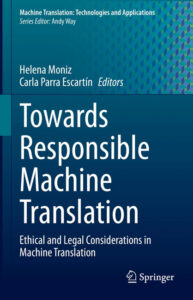 Books, PublicationsProlegomenon to Contemporary Ethics of Machine TranslationReijers, W., Dupont, Q. (2023) Prolegomenon to Contemporary Ethics of Machine Translation. In Escartin, C. and Moniz, H. Towards Responsible Machine Translation. Machine Translation: Technologies and Applications, vol 4. Heidelberg: Springer.
Abstract
Globalisation has triggered a proliferation of translation practises, many of which are mediated by machines. This development raises fundamental philosophical questions about language, writing, meaning, reference, and representation. This chapter builds a bridge between the ethics of machine translation and philosophy of technology. It starts by considering the activity of translation as such and argues that this is an inherently ethical activity because it involves sacrifice, establishes commonality between foreign elements, and invokes certain professional virtues. Consequently, the chapter asks what machines ‘do’ to translation practises, arguing that they fundamentally transform the activity of translation into the transcription of notations. This raises the philosophical questions of logocentrism, the extent to which machines translate the ‘presence’ of lived experience, and phonocentrism, the extent to which machines transcribe the spoken word. Based on this analysis, the chapter turns to three ethical questions that pertain to machine translation. The first is about responsibility: while machines rely on retrospective responsibility, can they deal with prospective responsibility in translation? The second is about hospitality: can machines adapt to foreign worlds without having the lived experience attached to these worlds? And the third is about virtue: can the exchangeability inherent to machine translation cohere with the incommensurability of the work of translation?
More information here. [...]
Books, PublicationsProlegomenon to Contemporary Ethics of Machine TranslationReijers, W., Dupont, Q. (2023) Prolegomenon to Contemporary Ethics of Machine Translation. In Escartin, C. and Moniz, H. Towards Responsible Machine Translation. Machine Translation: Technologies and Applications, vol 4. Heidelberg: Springer.
Abstract
Globalisation has triggered a proliferation of translation practises, many of which are mediated by machines. This development raises fundamental philosophical questions about language, writing, meaning, reference, and representation. This chapter builds a bridge between the ethics of machine translation and philosophy of technology. It starts by considering the activity of translation as such and argues that this is an inherently ethical activity because it involves sacrifice, establishes commonality between foreign elements, and invokes certain professional virtues. Consequently, the chapter asks what machines ‘do’ to translation practises, arguing that they fundamentally transform the activity of translation into the transcription of notations. This raises the philosophical questions of logocentrism, the extent to which machines translate the ‘presence’ of lived experience, and phonocentrism, the extent to which machines transcribe the spoken word. Based on this analysis, the chapter turns to three ethical questions that pertain to machine translation. The first is about responsibility: while machines rely on retrospective responsibility, can they deal with prospective responsibility in translation? The second is about hospitality: can machines adapt to foreign worlds without having the lived experience attached to these worlds? And the third is about virtue: can the exchangeability inherent to machine translation cohere with the incommensurability of the work of translation?
More information here. [...]
De Filippi, P. “Who Owns the Metaverse?” talk presentation for the 8th Hackers Congress Paralelní Polis (#HCPP21) organized by the Institute of Cryptoanarchy. Prague, Czech Republic. 1 October 2021
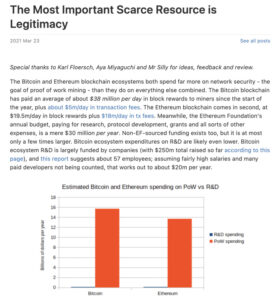
The question of legitimacy is increasingly relevant for understanding blockchain governance, and the purpose of this group will be to better understand the practical and empirical conceptions of legitimacy within blockchain communities. The task force will convene for bi-monthly discussions, eventually resulting in a collectively written report synthesizing insights from the discussions.
Mannan, M. “Blockchain Governance”, talk presentation for the Max Weber Programme at the European University Institute. Fiesole, Italy. 29 September 2021

With NFTs, authors can create “authentic” copies of a digital work which can be sold as ‘originals’, even though anyone else can freely reproduce and redistribute the ‘non-original’ copies of the same work.
The Creative-NFTs initiative aims to go one step further, leveraging the digital scarcity established by NFTs in order to promote digital abundance, encouraging authors and creators to maximize the dissemination of their digital works, as well as to facilitate the reproduction and the remix of these works.
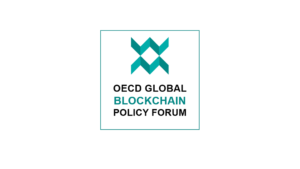
De Filippi, P. “Will the Revolution be Tokenized? Assessing Blockchain’s Promise and Progress in the Public Sphere”, panel presentation at the OECD Global Blockchain Policy Forum 2021. 15 September 2021 (online) Decentralised technologies are emerging as an important feature in the next evolution of the digital economy, and the foundation on which many beneficial new products, services and markets could
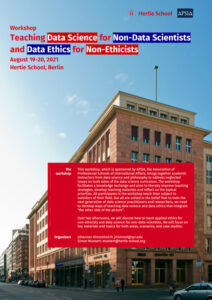
Reijers, W. “Teaching and Training in Data Ethics” presented at Teaching Data Science for Non-Data Scientists and Data Ethics for Non-Ethicists at the Hertie School, Berlin. 19-20 August 2021 This workshop, which is sponsored by APSIA, the Association of Professional Schools of International Affairs, brings together academic instructors from data science and philosophy to address neglected issues on both sides
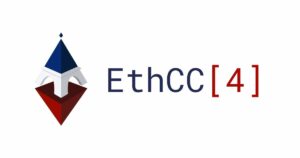
De Filippi, P. “Legal Challenges of NFTs as Applied to the Art World” presented at EthCC 4 (Ethereum Community Conference). 22 July 2021 (Paris)
De Filippi, P., Lane, A., Potts, J. “Blockchain is a Platypus: A New Theory of Rapid Technological Evolution” presented at the 18th ISS Conference organised by the International Joseph Schumpeter Society on “Schumpeterian perspective on Radical Change: Robotics, Artificial Intelligence and Broad Societal Transformations”. 8-10 July 2021.
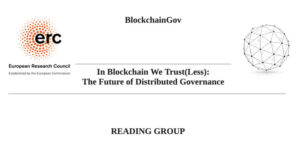
This reading group explored ways in which blockchain technology could contribute to bringing more trust and confidence in existing social and institutional arrangement. Readings covered notions of trust and confidence, investigating the extent to which blockchain technology can either strengthen or weaken these concepts. The goal was, ultimately, to have a better understanding of how to design blockchain-based systems that promote trust and confidence
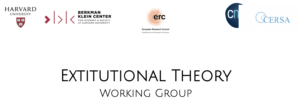
This working group studied and advanced the research on Extitutional Theory, a new field of scholarship that presents itself as a complement to Institutional Theory.









⇌ Stay up to date with our events, at the latest, by signing up for our mailing list ⇌
 This site is licensed under a Creative Commons Attribution 4.0 International License. The BlockchainGov project has been funded by an European Research Council Grant.
This site is licensed under a Creative Commons Attribution 4.0 International License. The BlockchainGov project has been funded by an European Research Council Grant.